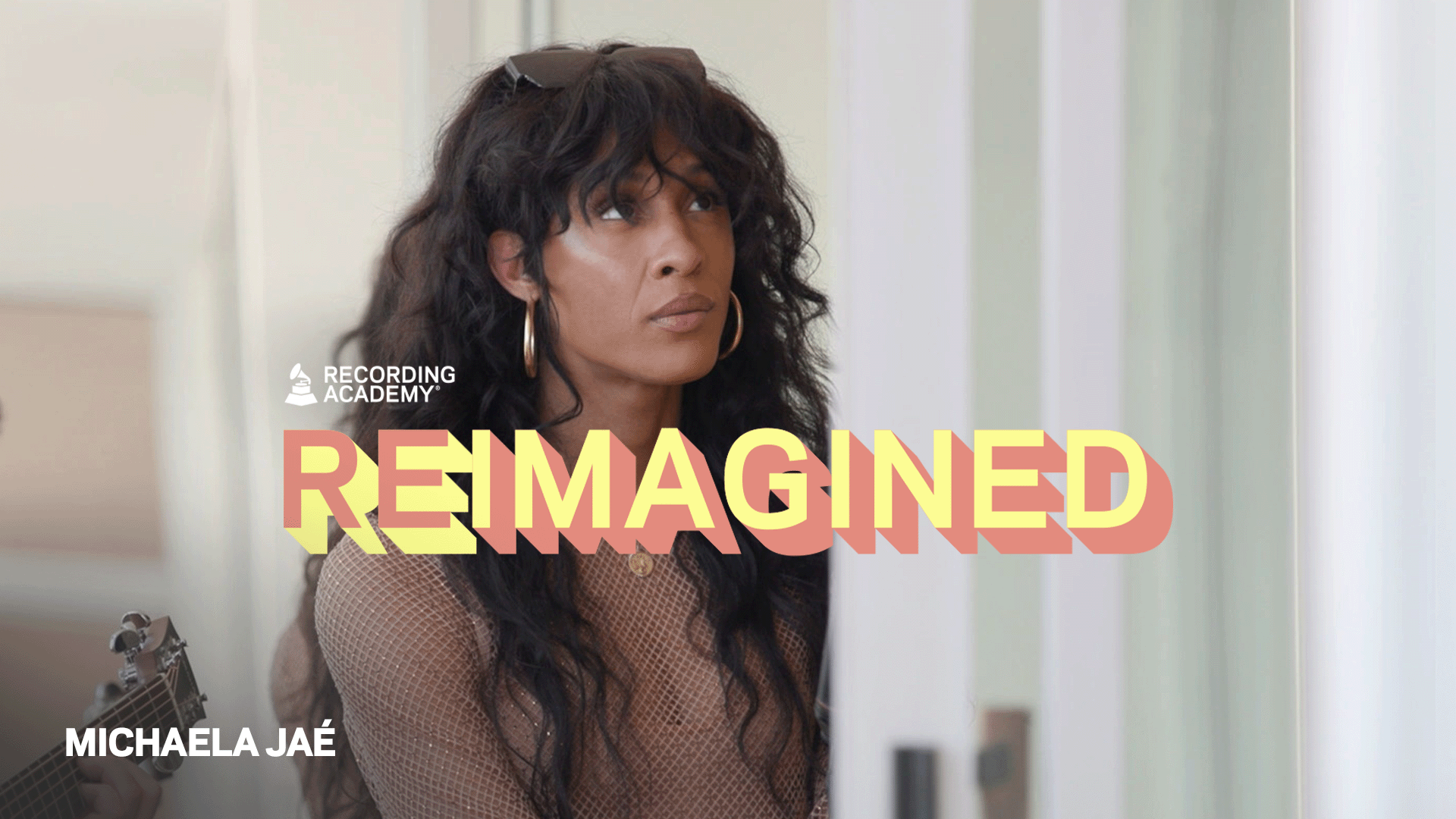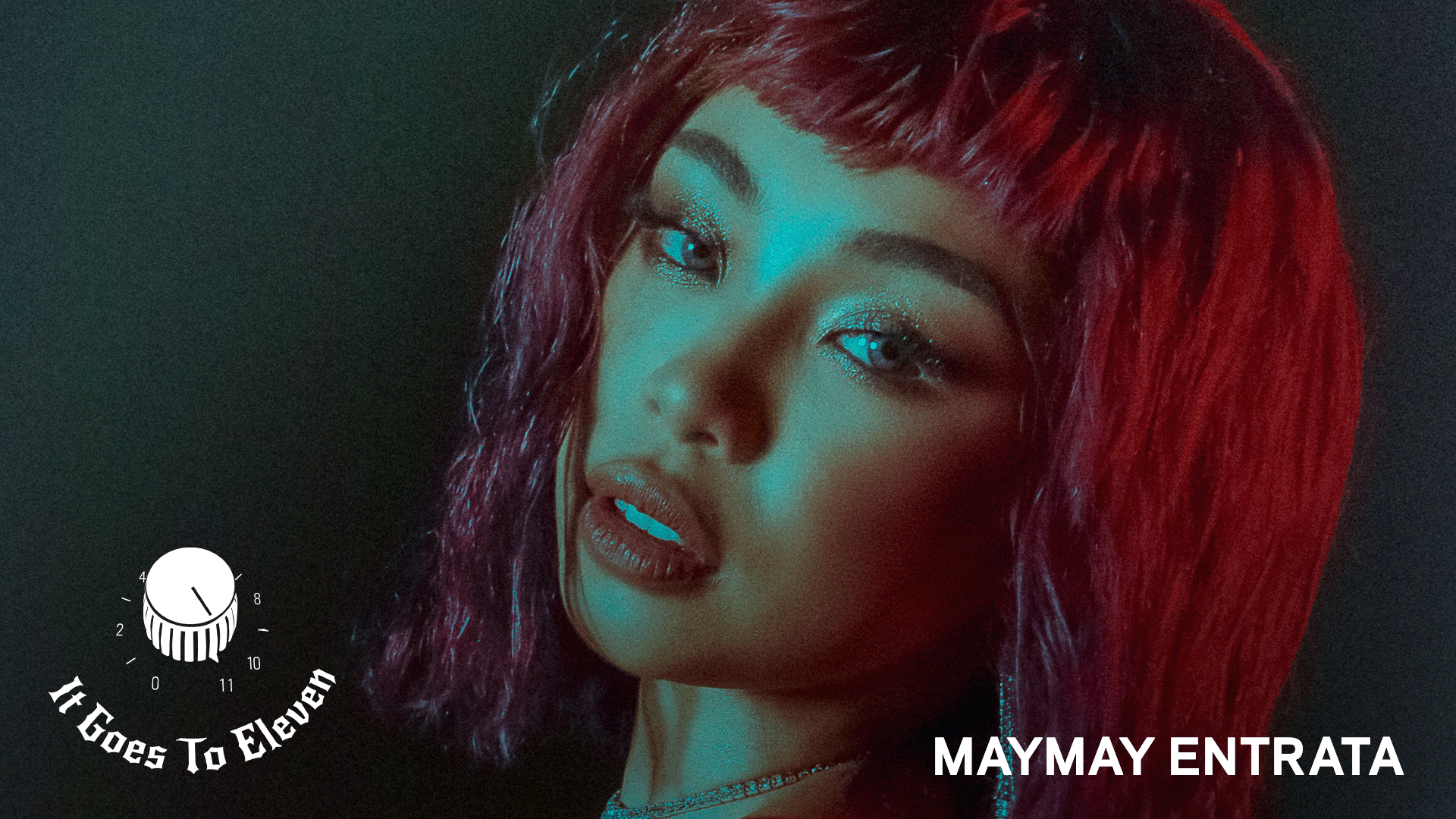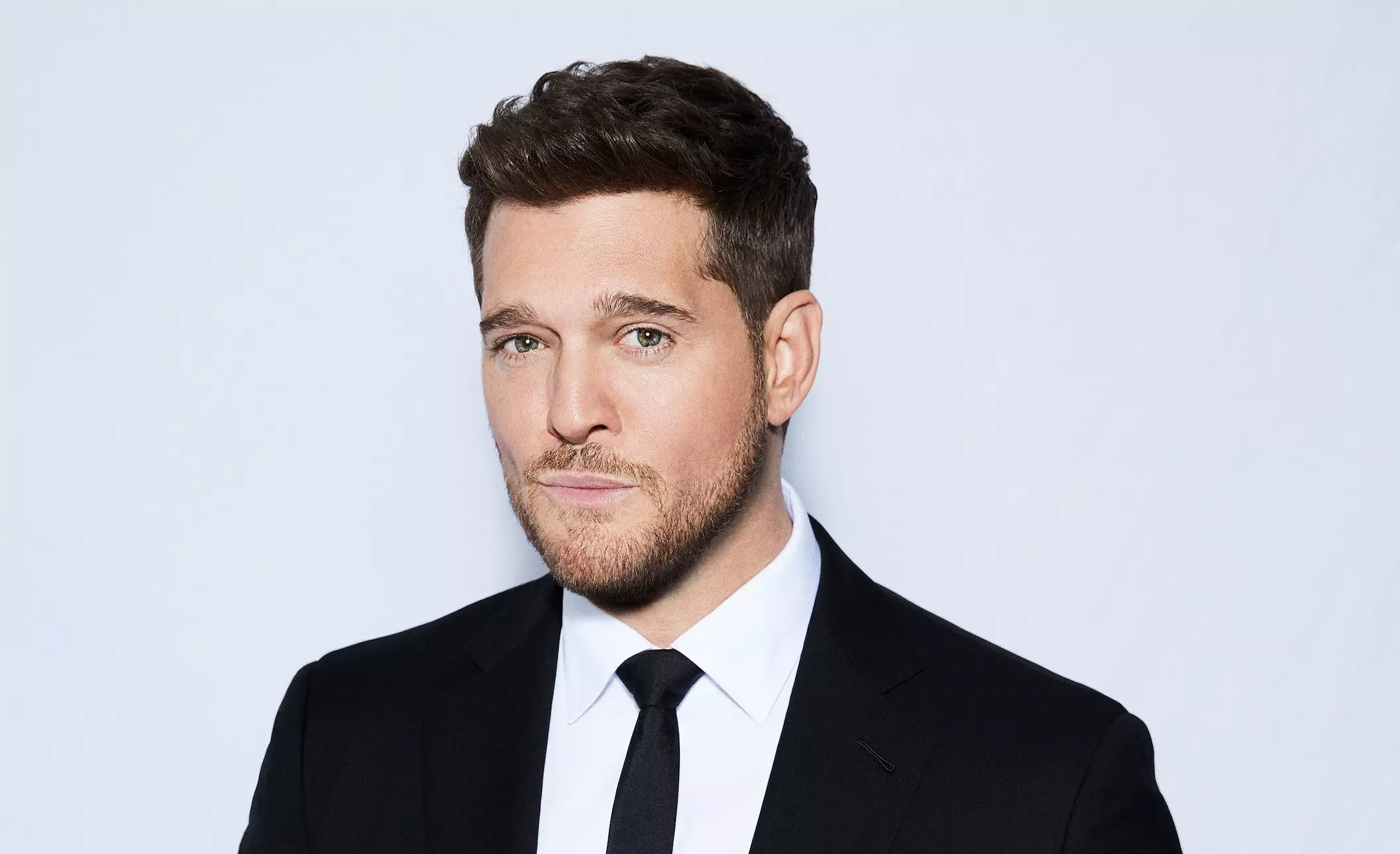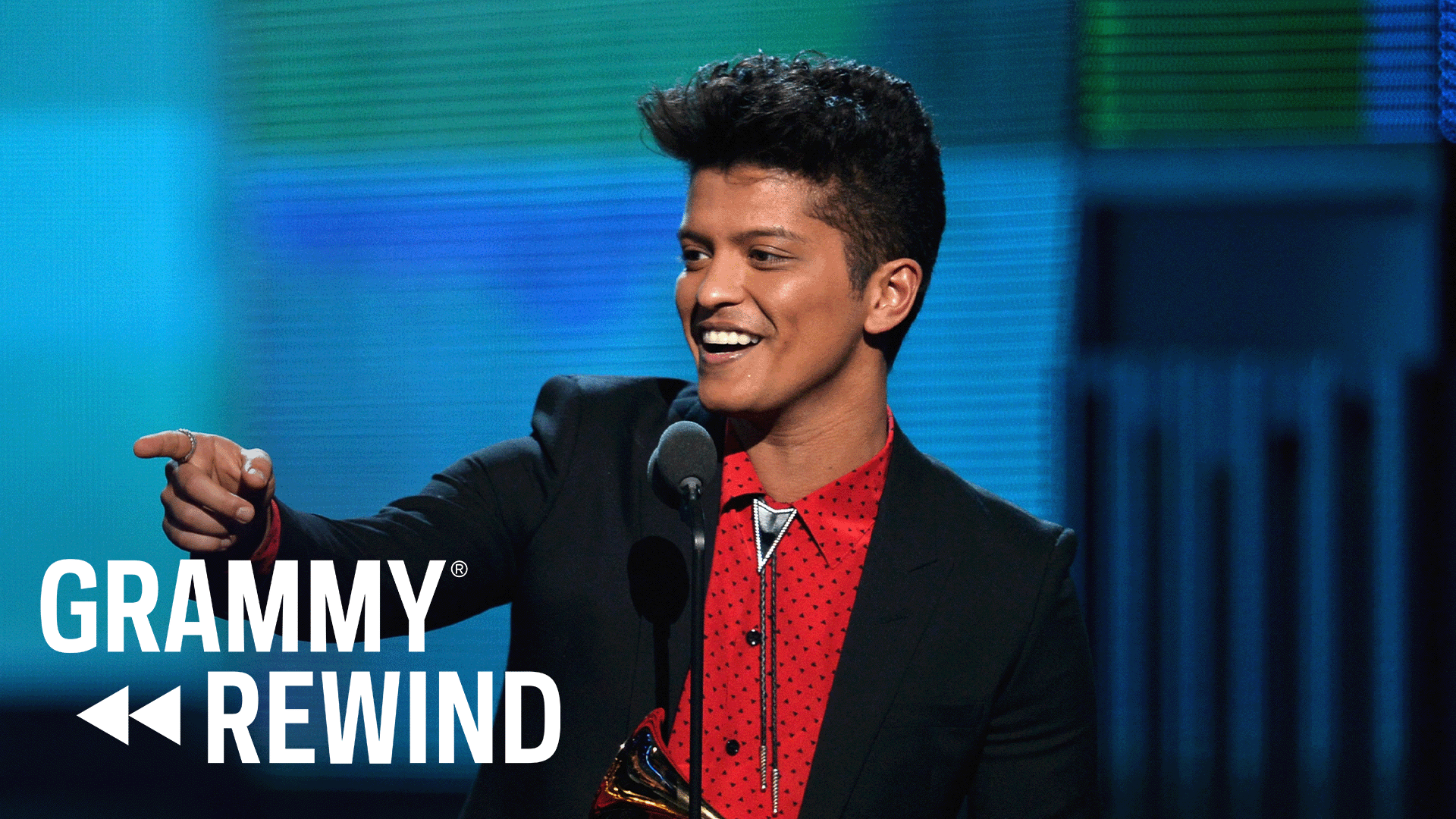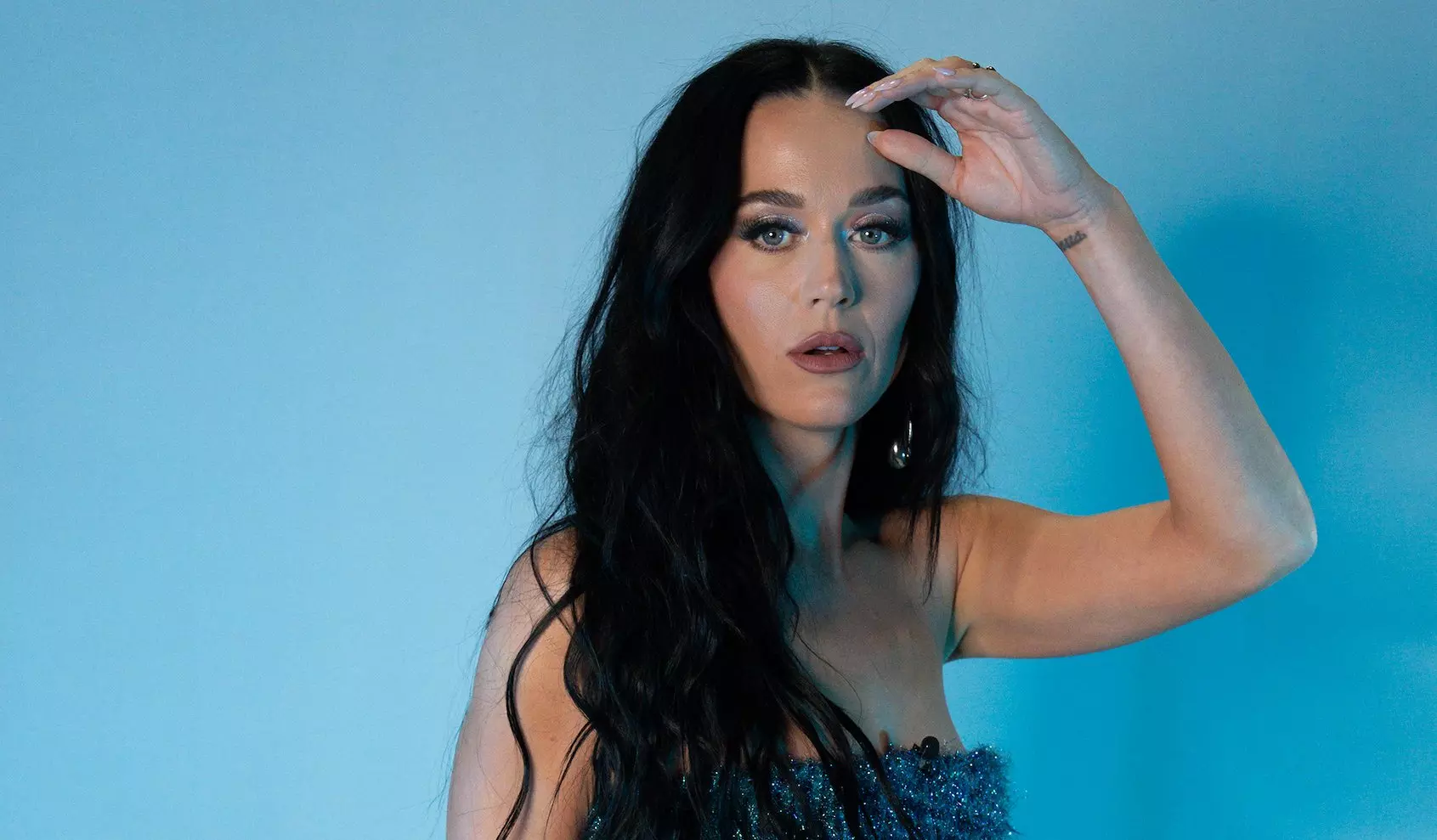PHOTOS (CLOCKWISE, L-R): KEVIN MAZUR/GETTY IMAGES FOR THE RECORDING ACADEMY, JEFF KRAVITZ/FILMMAGIC, MICHAEL CAULFIELD/GETTY IMAGES, CLIFF LIPSON/CBS VIA GETTY IMAGES, KEVIN MAZUR/WIREIMAGE

news
The Taylor Swift Essentials: 13 Songs That Display Her Storytelling Prowess And Genre-Bouncing Genius
Ahead of the 2023 GRAMMYs on Feb. 5 and Taylor Swift's "The Eras Tour" kicking off in March, revisit these 13 hits and beloved classics by the 11-time GRAMMY winner.
We're all under Taylor Swift's spell. From her poppy radio hits to her crying-on-the-floor anthems, her discography is as enthralling as it is extensive. She enchants with stories about not just heartbreak and lost loves, but also about wider reflections on life — self-worth, fame, politics, family, moving on, change.
Though Swift emerged as a country icon in high school, she has leapt across genres with ease in the years since, mastering them as well as shaping them. Whether she's busy conquering synth pop or molding indie folk, her songwriting cultivates a divine magic, one that merges reality and fiction with profound intimacy.
After expanding her sonic universe further with Midnights last year, Swift will kick off her "Eras Tour" in March. Simply the name of her tour indicates the expanse and power of her musical career thus far: as she bridges her eras, she builds her legacy.
Her legacy receives a unique nod through her four nominations for the 2023 GRAMMYs: while Swift is nominated for her Where The Crawdads Sing track, "Carolina," she's also nominated for songs that she wrote years ago, around the time of her original Red release. And just this month, Midnights' "Anti-Hero" broke Swift's personal record for her longest-running No. 1 single on the Billboard Hot 100, further proving that she hasn't lost her touch.
By cherishing her past while continuing to mold her musical future, Swift strikingly dominates with staying power. Ahead of the 2023 GRAMMYs and Swift's upcoming "The Eras Tour," here are 13 tracks that highlight Swift's evolution up to Midnights, honoring her trailblazing creativity and versatility.
"Our Song," Taylor Swift (2006)
A song about a song, how meta of Swift. One of her earliest meta songwriting moves, "Our Song" encapsulates a relationship's everlasting beauty with the warm breeziness of riding shotgun. Its lighthearted conversational lyricism emits an infectious joy that helped introduce Swift as a songwriter who is both relatable and captivating.
The banjo-led tune establishes the singer's country roots with a casual, but vivid image: Swift grinning with her elbow on the car door, hair windswept with the windows down. She may have written "Our Song" for a talent show back in high school, but Swift clearly had the songwriting prowess of a superstar — one that grew well beyond freshman year.
"White Horse," Fearless (2008)
Just two tracks after the whirlwind romance of "Love Story," Swift finds herself closing her fairytale storybook to disappointment. While "White Horse" sees the singer question her self-worth and cradle her crushed dreams, the heartbreaking track ended up earning Swift two GRAMMY Awards for Best Country Song and Best Female Country Vocal Performance in 2010. (The singer scored her first GRAMMY wins that year, taking home four GRAMMYs total. To date, Taylor Swift has won 11 GRAMMYs and received 42 nominations overall.)
Although the acoustic ballad wallows in sorrow, gloom eventually blooms into a necessary epiphany: "I'm gonna find someone someday who might actually treat me well," Swift realizes in the final chorus. In this way, "White Horse" prevails as one of the singer's most powerful ballads to date — and judging by what Swift has said about Midnights track "Lavender Haze," that realization has come true.
"Forever & Always," Fearless (2008)
"Forever & Always" is arguably one of Fearless' staple tracks, but what many fans may not know is that the timeless track almost didn't make the album. The pop-rock anthem track sees Swift denounce a hypocritical ex who misled her, and she criticizes them with a slew of questions she already knows the answers to: "Were you just kidding?" "Was I out of line?" "Did you forget everything?" From distress to confusion to anger, the song bursts with warranted rage at a betrayal, cementing Swift as a master of channeling heartbreak.
"Enchanted," Speak Now (2010)
Long before "Enchanted" spiraled into one of Swift's many viral TikTok moments, the Speak Now deep cut bewitched listeners from the second it arrived more than a decade ago. The song hums with anticipation, with early acoustic guitar later giving way to overwhelming yearning and anthemic production.
The way the song progresses is almost like a fairytale, starting with a longing stare and playful conversation before ending with a rosy-cheeked walk home. It's a near-perfect display of Swift's ability to capture an incisive, fleeting romance in song, from the smitten lyrics to cinematic production. And though the love song serves more of a captivating cliffhanger than a finished chapter, its story still leaves listeners blushing all the way home.
"Back To December," Speak Now (2010)
On Speak Now's "Back to December," Swift sifts through wilting roses and missed birthdays to unearth a sorrowful confession. As she comes to terms with her regret over ending a healthy relationship, the track swells with guilt and sincerity. While many of Swift's preceding romantic songs were characterized by longing or criticism, "Back to December" takes the rare form of a bittersweet, candid apology that exhibits maturity and grace.
"Mean," Speak Now (2010)
Complete with banjo and fiddle, "Mean" isn't just the only country-driven track on Speak Now, but it's also one of the last truly classic country songs of her catalog. The album's spunky sixth track goes down as one of Swift's most beautifully berating to date — even alongside "Look What You Made Me Do," "Bad Blood," and "Picture to Burn" — as she lambastes a cruel critic and realizes her self-worth.
Ironically, the Swift track that most put haters on blast is one of her most critically acclaimed, as the song won Swift two GRAMMY Awards for Best Country Solo Performance and Best Country Song in 2012. "Mean" also thrives as a manifestation — she has certainly become big enough that they can't hit her.
"Blank Space," 1989 (2014)
Nice to meet you, where you been? Swift's 1989 era submerged the singer in heavy synth and kaleidoscopic pop, and the record's exuberant second single "Blank Space" best flaunts Swift's multifaceted artist persona. The illustrious pop song satirizes the media's image of Swift as a serial dater, coasting with a sultry liveliness before escalating into ferocity.
Swift is scathingly and brilliantly self-aware as she acknowledges the world's view of her reputation: "Got a long list of ex-lovers/ They'll tell you I'm insane/ 'Cause you know I love the players/ And you love the game."
She continued poking fun at the "crazy ex-girlfriend" trope in the music video, from wrecking her former lover's car to setting his clothes on fire. The cleverly self-deprecating narrative (and genius visual) helped "Blank Space" become Swift's biggest streaming song to date, garnering a whopping 3 billion views on YouTube alone.
Accolades aside, "Blank Space" marked an important turning point for Swift. It was the first time she used her autobiographical songwriting style to take the power back — and most importantly, prove that no matter what is said about her, she'll keep cranking out the hits.
"Don't Blame Me," reputation (2017)
Defiance defines "Don't Blame Me," the fourth track from Swift's intrepid — and perhaps most unexpected — album reputation. The track personifies catharsis, uplifted by heavy bass and hard-hitting synth. Although the song is loosely about an intoxicating love, its ambition also represents Swift reclaiming her narrative once again.
Drawing comparisons to Madonna's "Like a Prayer" and Hozier's "Take Me to Church," the song marks more than moody melodrama, but shamelessly moving forward. Amid public quarrels with other celebrities — as well as the tabloids' obsession with her personal life — she makes a very definitive statement: don't blame her.
"Cruel Summer," Lover (2019)
"Cruel Summer" strikes Swift's discography in a zealous way, recalling the dreamy worlds of 1989's "Style" or reputation's "Getaway Car." The song sees Swift reminisce about a whirlwind summer romance with bittersweet intensity.
The track's assertive, immaculate electropop writhes irresistibly as Swift navigates the stark pain of secrets and love. Everything about "Cruel Summer" is sharp and exquisite, and the way its bridge bursts with melodramatic vigor is enough alone to make this a vital Swift track, even if it wasn't a single.
"the last great american dynasty," folklore (2020)
"the last great american dynasty" flourishes as one of Swift's most lucid, exquisite storytelling ventures — and as any Swiftie knows, that's saying something.
Reading like a short story, the crisp indie track recounts the life of American socialite Rebekah Harkness, one of the former owners of Swift's Rhode Island mansion. Swift weaves the past and present together seamlessly, drawing parallels between herself and Harkness with vivid detail and keen clarity. On this folklore track, Swift presents a refreshing creative vision by flaunting a new, innovative facet of her songwriting prowess.
"betty," folklore (2020)
Swift's first indie-folk foray, folklore, spins a tantalizing fictional love triangle across three tracks: "cardigan," "august," and "betty." The latter shimmers with reflective hope and heartache from the perspective of a character named James.
The apologetic, harmonica-driven folk rock track is reminiscent of Swift's earlier, country-rooted music — yet, the way its intricate narration uniquely interlocks with other album tracks is more characteristic of Swift's modern storytelling craft. Swinging between lighthearted and forlorn, "betty" cements Swift as a mystical mastermind.
"All Too Well (10 Minute Version) (Taylor's Version) (From The Vault)," Red (Taylor's Version) (2021)
Swift's "All Too Well (10 Minute Version)" might very well be her magnum opus. Although the original beloved song from Red was never released as a single, it emerged as a fan favorite for its tragic retelling of visceral heartbreak. And once Swift released a new — and much longer — 10-minute edition of the gut-wrenching track on Red (Taylor's Version) nearly a decade later, it almost instantly became the fan favorite.
The song broke the Guinness World Record for being the longest song to reach No. 1 on Billboard Hot 100 (beating out Don McLean's "American Pie"!), and its cinematic music video "All Too Well: The Short Film" continued to stretch the Swift multiverse. With lucid lyricism, cathartic storytelling, and riveting melodies, "All Too Well (10 Minute Version)" triumphs as the pinnacle example of everything that makes Swift a revered songwriter and certified star — one who continues to shine like an ever-lovely jewel.
"Anti-Hero," Midnights (2022)
"It's me, hi, I'm the problem, it's me," Swift sighs on "Anti-Hero." Self-hatred takes center stage on the lead single from Midnights, inspired by the singer's insecurities, nightmares and fear of depersonalization.
Over a swirl of steady upbeat production, the pop song draws comparisons to the heartbreaking honesty of Lover's "The Archer." Her poetic candor takes on a self-destructive quality ("I'll stare directly at the sun but never in the mirror," she admits) that conveys an all-consuming loneliness — and at the same time, stark self-awareness.
Yet, Swift isn't an anti-hero, she's a mastermind. Serving as a "guided tour" of the things she tends to hate about herself, "Anti-Hero" spotlights not only the weight of Swift's vulnerability, but also its power. This capability transcends beyond Midnights; her sweeping creative force stretches across her past records and conquered genres. And even despite any insecurities, her influence has only continued to grow — showing that Taylor Swift will never go out of style.
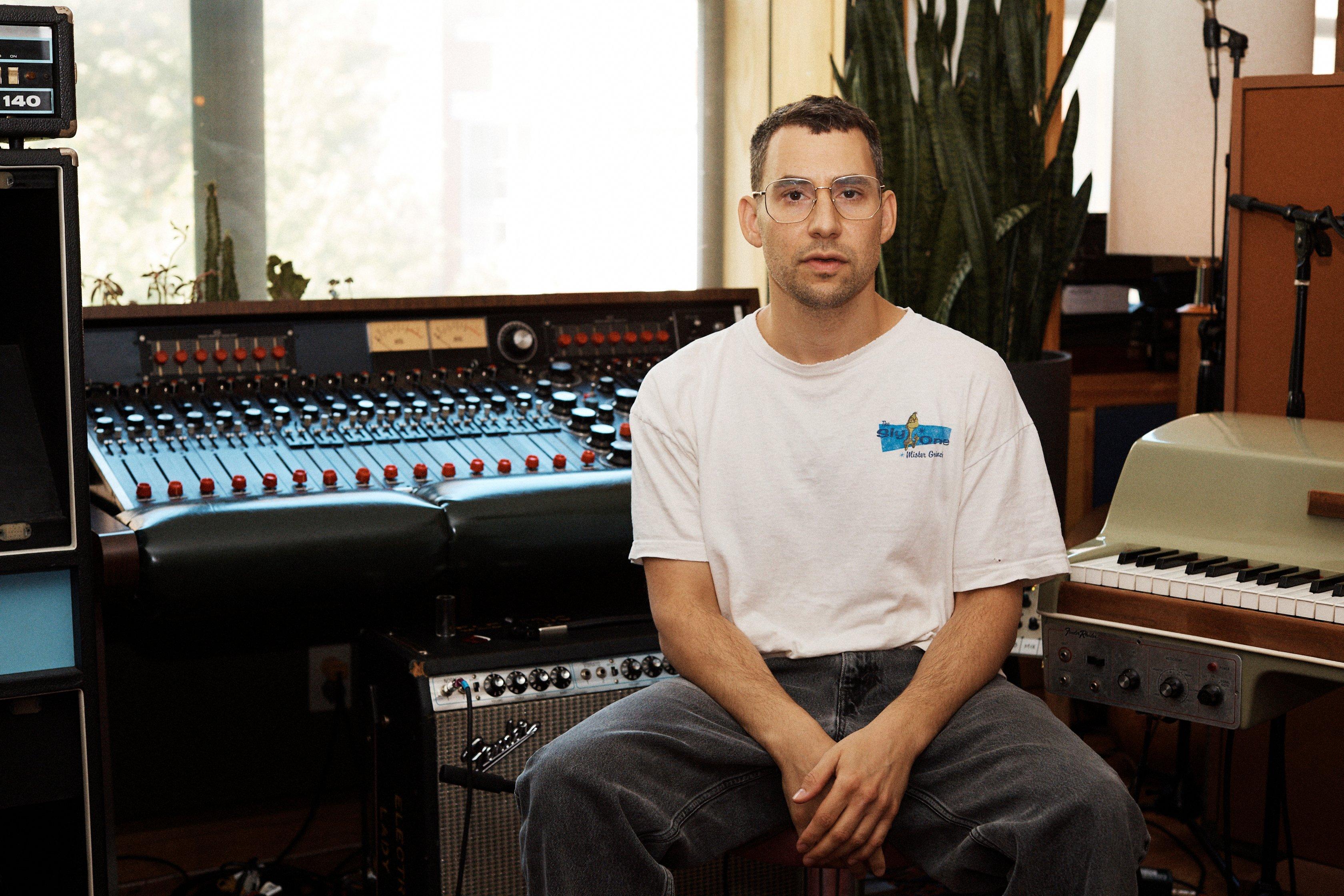
Photo: Alex Lockett
interview
Jack Antonoff's "Grand Desire": Why Working With Taylor Swift, Sabrina Carpenter & Bleachers Is His Dream Creative Playground
Jack Antonoff has a simple wish: to "write and produce things and play live." The GRAMMY-winning producer is living his dream, and discusses his roster of all-star collabs, creating studio vibes, and the importance of looking back.
"I think collaboration boils down to the core belief that something can work," Jack Antonoff recently told GRAMMY.com. "When I make an album with someone, I'm filled with faith that much more in my life or the universe can work, which is definitely a reason why I do this."
The 11-time GRAMMY-winning singer, songwriter and producer has worked with many of the biggest modern pop stars — from Taylor Swift, Lana Del Rey and Lorde, to St. Vincent and Sabrina Carpenter — but his core focus has never changed. Antonoff simply wants to make music he loves with people he loves, and perform it live.
Antonoff not only holds many peoples' dream job of being Swift's go-to collaborator, but he's been having a banner year filled with notable creative projects and big wins. At the 2024 GRAMMYs, he won Producer of the Year, Non-Classical for the third year in a row. He also earned two more GRAMMYs that night, sharing Best Pop Vocal Album and Album Of The Year with Swift for his extensive production work, co-writing and instrumentation on Midnights. In March, he released his fourth album as Bleachers and launched a lengthy world tour with the band, which will wrap with their biggest-ever (sold-out) gig at Madison Square Garden on Oct. 4.
His 2024 production credits include Swift's The Tortured Poets Department, four of breakout star Carpenter's Short n' Sweet tracks including No. 1 hit "Please Please Please," and even one of Kendrick Lamar's Drake diss tracks, "6:16 in LA." He also curated and produced the soundtrack for Apple TV's WWII couture period drama "The New Look," featuring modern renditions of classics by Lana Del Rey, Florence Welch, Nick Cave and others. He was also tapped by Tony-winning director Sam Gold to create the soundtrack for a modern reimagining of "Romeo and Juliet," debuting on Broadway later this month.
Before Antonoff became one of the most in-demand producers in pop, he spent his time in bands. As a high school senior in 2002, he formed indie rock outfit Steel Train with several classmates, who'd have a decade-long run playing big festivals including Bonnaroo, SXSW, Warped Tour and Lollapalooza. Afterwards, he played guitar in the power pop trio fun. with whom he earned his first six GRAMMY nods and won his first two in 2013, for Best New Artist and Song of the Year for their anthemic hit "We Are Young" featuring Janelle Monáe.
2013 was a pivotal year for the "Tiny Moves" artist, as it also marked his first time he worked with Swift, who then enlisted him to support her transition away from country music on Album Of The Year winner 1989. Antonoff has said that she was the first artist to trust him as a producer, and that their work together, understandably, opened many other doors for him.
GRAMMY.com recently caught up with the prolific producer and artist for a dive deep into his collaborative magic, the latest Bleachers album, and why he thinks pop is whatever you want it to be.
This interview has been edited and condensed.
There's a lot to talk about just from this year, it's pretty crazy.
When the Bleachers album came out and I was starting to do interviews, I had this really weird experience. Interviews recap things that have happened, so [they make me] realize how little I think about the past. I don't know if that's a good or bad thing.
I think it's a symptom of how much my life is future-focused — which is something I really like and fear about my life at the same time. The studio is such a forward place. You're thinking about the next thing, how to find this next feeling in literal and esoteric ways. [Being on] the road is one of the most literally forward places — every day you're somewhere new and you're thinking about the next day and the tour.
I feel like I'm trapped in the future. It's nice and I've designed it that way. But sometimes I get a little scattered or emotional when I talk about things that have happened because I'm thinking about them for the first time. I don't have canned answers.
You're often called a super-producer, which is valid; you've worked with so many big artists and on so much music that everyone hears. But what are you desiring as an artist and a producer lately?
The grand desire that I have has never changed, because it's so much bigger than any amount of success. That desire is to write and produce things and play live. That's a big part of why I love this work so much is because nothing can really help you with that besides your soul. You could be in the most expensive studio in the world with all the best engineers, but there's no proof that [that setting] equals a better song than just sitting in your room.
That fleeting feeling of knowing that it comes and it goes, and you just have to be there to grab it, is such a deep connected-to-the-cosmos feeling.
When you're working on music, at what point do you get excited about a song or know that it's going in the right direction?
When it does happen is when I start to push it forward in a real way. There's an amazing amount of f—king around in search of that feeling, and you never know where you're going to get it. It's sometimes just moving around instruments or lyrics or thoughts with no direction until one thing feels exciting, and then you follow that thing.
It's a really fun process, and it can be anxiety-producing. It's a different kind of fun when you do it with someone else, because you're on this weird adventure together. When you're in a room with other people and everyone has that feeling off of one idea or one sound, it's a very connecting feeling.
When you're working on your own music, particularly with Bleachers, it's mostly just you in the studio, right?
Yes. But the Bleachers process is oddly similar [to my producing], just sort of flipped. I work with producers on Bleachers because I need it sometimes. I've always had these two sides of writing my music and having my own band and needing help with that in various ways. I've learned so much on either side.
Being on the road with Bleachers, remarkably, keeps me connected to everything that matters the most when I'm making records with other artists because I can very easily visualize real fans, the people who live and die by this music. To be acquainted with them every night is a very powerful experience. It always just reminds me who I'm in conversation with, because I think it's easier than ever to get lost.
You've had a busy summer on the road with the Bleachers. How has it felt performing this album live?
It's really my favorite ever. It's the first album I've made with Bleachers that feels like a response to this thing that happens at the shows. Somewhere during the Take the Sadness Out of Saturday Night [tour in 2021], the shows got really crazy and loose and kind of off the wall. There was something about it where I was kinda like, Okay, you want to play chicken? [Laughs.] I went into the studio and I tried to one up them. I never felt that before. This time I was talking right at [my fans], which is a luxury of being known by them.**
The first song we ever released was "I Wanna Get Better," which is almost a Wikipedia page of my life, it rattles through everything I'm going to be talking about [forever]. It feels like now I can wax on about something, and they know what I'm talking about.
Is that why you decided to self-title this album?
The actual decision to self-title is a gut feeling. But the real reason is it felt like an earned moment, like we had arrived somewhere where everything had completely formed.
Every reference point [while] making this album became about our own history and our own mythology. In the past, I would have said, Make it like a Mick Fleetwood or Ringo kind of feel. Now the reference point would be Play it like you do at this point in the set when the wheels have blown out for you. You tour and spend enough time with people where it becomes almost like conversations with your best friends, the reference points become your own shared history.
What called you back into the studio to make your own music?
I never know. My life is a lot less structured than people would think. The way I make Bleachers records — and even in everything I make with other people — there's a real looseness to it because I like to be [in the studio] when I feel incredibly excited to be there. I schedule things, just not terribly far out.
For example, Lana and I or Taylor and I have never once been like, "Let's book out a month here." It's sort of like, "What are you doing today? I got this idea, come over." And then if that's feeling good, it's like, "What are you doing tomorrow? Let's keep this going." It's very [much] catching it when it's happening. Some days I'm in the studio for an hour, some days for 16 hours; it's all based on how I feel.
Are you always working on music or ideas — is there always something that's coming out of you?
Lately — the past couple years — I've been feeling the need to create a lot. I feel connected to something, and I feel a lot of joy and that good buzzy anxiety of having these ideas and wanting to hear them, which reminds me of my earliest memories of writing and producing music. When you hear the thing in reality — you can press play on a thing that was a thought — it's the most incredible experience.
"Alma Mater" is such a poetic way to refer to an ex. How did that track come together? Did you have Lana del Rey in mind for it?
No, we were just f—ing around. I think a lot about where you put people [when listening to a song]. On that song, I wanted to put you in a room with me and her, so I left a lot of the elements of us being in the room writing it, messing around. We kept singing back and forth like, "She's my alma mater, f— Balenciaga." [Chuckles.] The lyrics were just making us smile.
As it started to come together, this idea of referring to an old relationship as an alma mater, that excited me and made me want to write that story. That's kind of what an old relationship is: a school that you go to where there's a whole set of friends, and a whole culture, and when it's over, poof, it's gone.
Obviously, you worked with Sabrina Carpenter on some of her new music…
How brilliant is she?
Read more: How Sabrina Carpenter Became A Pop Queen: Tracing Her Journey To 'Short N' Sweet'
She's around the same age Taylor Swift was when you started working with her. Do you see any parallels with Sabrina where Taylor was at then? Sabrina has said it was a really big deal to get to work with you. What was it like working with her?
It was a big deal for me to get to work with her. The great parallel is brilliant writing and being able to write about one's life in the most vulnerable and powerful way. It sounds so simple, but it's the rarest thing to be able to write about your life and to be able to make it so specific and also so poetic. You know it as soon as you hear it.
Can you talk a little bit about the sonic landscape on "Please Please Please"?
We were thinking a lot about joy and the kind of fantastical nature of ABBA, Dolly [Parton] and ELO that I felt would fit her voice and lyrics so well. She [does] this quick vacillation between really cheeky then really emotional, back to really sarcastic, and then she smacks you over the head with something so serious and real that you're stunned. It's my favorite kind of music.
One of the reasons it's so thrilling to me that so many people have responded to it is because it doesn't sound like anything that's going on at all, it almost sounds like the opposite of everything going on. Those are my favorite moments; when something out of left field grabs everyone's attention.
Those bubbly sounds right when "Please Please Please" comes in are not in time. You have a LinnDrum ['80s drum machine] and a live drum playing this tight beat and these country-picking acoustic guitars. Then you have these wobbling synths that, in my head, I'm playing the same way someone would play it when it was first invented because you're just playing along to the track, you're not locking it to any MIDI or anything. I was thinking a lot about that time period — I think about [it] all the time — when I was with Sabrina.
How has your creative partnership with Taylor Swift and your trust in each other evolved in the decade-plus you've been working together? And what has been the coolest thing for you to see in your ongoing work?
As far as evolution, we just have our own language. I saw her play last night [at Wembley Stadium in London], and actually played some songs there too. Most of the time when we work it's just her and I in a room, usually my apartment or Electric Lady [Studios]. To see [the songs] in literally the biggest spaces and retain all of [their] importance and soul and feeling like it's that for every single person in that crowd, it's like the absolute coolest.
She's the absolute greatest of all time, with a never-ending hunger to push forward.
You and Taylor both have such an affinity for witty, nerdy, literary references, and poetic phrasing. How do you pull that out in a way that makes sense in a pop song structure?
I think that tendency is just inherent in both of us. But I think the concept of pop structure is whatever the hell we want it to be. The worst of pop music is ambulance-chasing. The real inspiration is to be your own loud light-up machine shooting down the street. The things I've loved about pop music have just invigorated me to believe that pop music is whatever the hell the person making it says it is, and then everyone else gets to argue if it is or isn't.
I don't sit around and think about genre, placement, or who they're going to satisfy. All those thoughts are not just the death of making things. It's pretty easy for me to only consider that gut feeling. I'm just fascinated by how people hear things. There's no genre of music that I think is better or worse than any other one.
What can you tell us about the upcoming Romeo + Juliet Broadway show you soundtracked? Was it a different creative exercise for you to score such a well-known text; how so?
It was a very different process which is exactly why I wanted to do it. Credit to [director] Sam Gold who really let me fly out to left field and back. I'm about 50 percent through it and I'm going to finish it when I'm home from this tour. It's been something that has opened my world in many ways, to a whole new side of scoring and writing for a musical.
You have a lot of GRAMMYs, 11 of them —
People always ask me if it gets normal. No, it doesn't get normal! It's crazy.
One, where do you keep them?
That's one thing I've never really figured out, they kind of move around. Everything in my life moves around a lot, so I don't have a satisfying answer for that one.
And going back to 2013 when you won your first GRAMMYs with fun., how did you feel that day?
F—ing shocked. As I was saying, I don't really sit around thinking about the past because it's the opposite of the job. What's so shocking about those moments is you're surrounded by family and the people you love and work with, and it's this huge moment to think about how you got to that point.
My biggest takeaway of these experiences that force you to stop and think about the road behind is just how heavy they are. All of us are held up by really special people, whether it's partners or parents or siblings, fans, engineers, managers, loved ones. If you have amazing people around you, it's the best feeling in the world. That's my favorite part about any award, it feels like it's for everyone that got you there.
The Latest Pop Music News & Releases
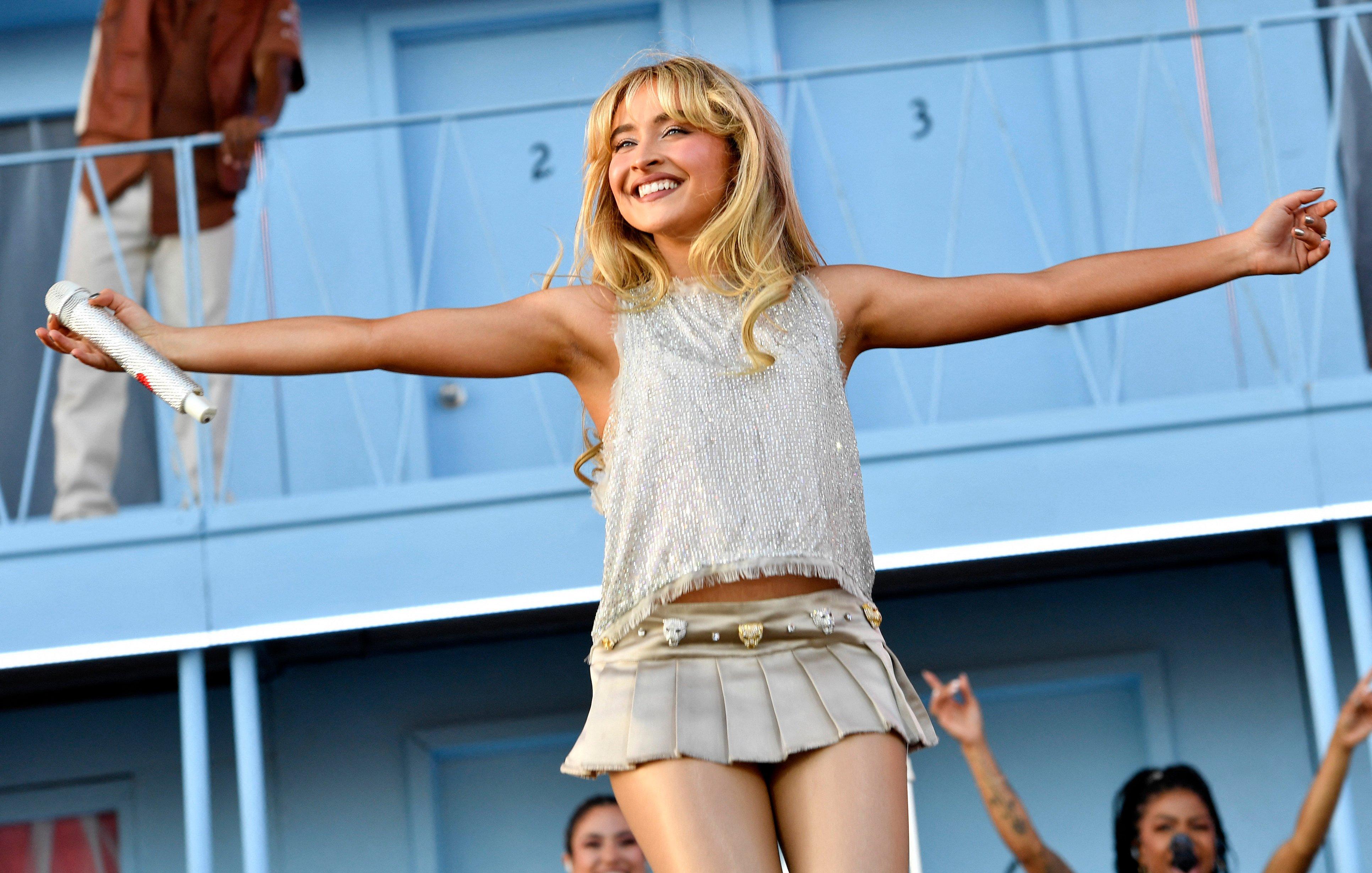
Photo: ALERIE MACON / AFP via Getty Images
feature
How Sabrina Carpenter Became A Pop Queen: Tracing Her Journey To 'Short N' Sweet'
More than a decade in the making, Sabrina Carpenter is living out her superstar dreams. As she releases her new album, 'Short n' Sweet,' look back on the chart-topping star's journey and how every venture helped her evolve into a pop phenom.
Sabrina Carpenter is the first to admit that it's taken her a bit of time to find her way to the top of the music industry. She even likens herself to the tortoise in the fable "The Tortoise and the Hare" — even if she didn't want to believe the metaphor growing up.
"Something that my mom always said to me as a little girl that really annoyed me was that I am the tortoise… throughout my life, [I was] being told, 'Sabrina, you're the tortoise, just chill,'" Carpenter recalled while accepting the Variety Hitmakers Rising Artist Award in December 2023. "In moments of frustration and confusion it can feel like a letdown, but it turns out it's actually a very good thing."
It's been a very good thing for Carpenter, indeed. A decade since the release of her debut single, the singer/songwriter isn't just breaking through — she's one of pop's new reigning queens. Over the last year, Carpenter has nabbed her first No. 1 song on the Billboard Hot 100, made a stellar debut at Coachella, and performed on "Saturday Night Live," all the while racking up billions of streams on her music new and old. It's all built excitement for one of the most anticipated pop albums of the summer: Short n' Sweet.
As Carpenter unveils her new album, take a deep dive into her decade-long journey to pop stardom.
Getting Started: Disney Breakthrough
Growing up, Carpenter filled the sounds of her family home in Pennsylvania with covers of songs like Adele's "Set Fire To The Rain" and "Picture to Burn" by future Eras Tour companion Taylor Swift (more on that later). After submitting videos for a singing contest spearheaded by Miley Cyrus, Carpenter would get her first taste of success. Placing third, she caught the eye of Hollywood Records, who signed her following the competition.
Simultaneously, Carpenter also began pursuing acting, landing guest spots on series like "Law & Order: Special Victims Unit" in 2011 and joining "The Goodwin Games" in 2012. In 2014, she landed a lead role in the Disney Channel series "Girl Meets World," a spin-off of the beloved '90s series "Boy Meets World," which served as a breakthrough moment for the burgeoning star — and a catalyst for her music career.
Just before the show debuted, Carpenter released her debut single, "Can't Blame A Girl for Trying," the title track to her debut EP that arrived a month later. While the four-track EP was the typical output of a teenage Disney star — bubblegum pop sounds with digestible, family-friendly lyricism — it showed off her youthful timbre and offered themes that would become prevalent later in Carpenter's songwriting: love, heartache, and navigating life.
A year later, she released her debut album, Eyes Wide Open. A mix of pop with folk and country influences — a soundscape that remains on Short n' Sweet — Carpenter's debut showed maturity and growth following Can't Blame A Girl For Trying; songs like "Eyes Wide Open" and "We'll Be the Stars" showed a more introspective side, reflecting on the pressures of being in the spotlight and the journey of finding her identity. Eyes Wide Open also hinted that Carpenter was beginning to hone her songwriting skills, penning four of the 12 tracks.
It would be on her 2016 sophomore album, EVOLution, where Carpenter would find confidence as a songwriter, co-writing all but one song on the 10-track project. In turn, the lyrics reflected her growing sense of self and a new perspective on past themes, like embracing non-romantic forms of love in "All We Have is Love," being there for a struggling friend in "Shadows," and learning to assert boundaries in "Space."
EVOLution transitioned Carpenter out of the teen pop aesthetic into a more sophisticated sound, experimenting with dance-pop and techno sonics. Genre versatility would become a throughline of sorts for Carpenter, and EVOLution foreshadowed the multifaceted musicality that was to come.
Shedding Disney: From Child Actor To Pop Star
After "Girl Meets World" came to an end at the beginning of 2017, Carpenter was ready for reinvention. Much like Britney Spears' Britney and Cyrus' Can't Be Tamed before her, as Carpenter grew into an adult, she felt like she needed to shed the Disney-fied image that has become a rite of passage for teen stars. Thus began the Singular era.
Released in 2018 and 2019, respectively, Singular: Act I and Singular: Act II featured songs that were more risqué and mature in nature. A far cry from her tamer work of the past, the R&B track "Hold Tight" is equal parts sultry and evocative with Carpenter singing, "Wanna keep you in, wanna keep you in right/ Wanna feel your skin, wanna feel it on mine."
As she noted in an interview with Billboard, Singular: Act I was a natural progression for a girl now in her late teens — even if it was against the squeaky-clean image of her beginnings.
"I was known as a fictional character on television with lines that were written for her with an attitude that was portrayed in a way by other people. So for a lot of people, their first impression of me was as a 13-year-old girl [singing] the kinds of songs that she should be singing," she said. "Then, flash forward to 19, and people are asking why I am not singing about the same things that I did when I was 13, as if that's normal."
One of the more notable Singular tracks is from Act I, "Sue Me." Sneakily disguised as a story about a romantic relationship, the song is Carpenter's response to being sued by her ex music managers: "That's my shape, I made the shadow/ That's my name, don't wear it out though/ Feelin' myself can't be illegal." Its tongue-in-cheek and snarky nature would inevitably embolden Carpenter to continue writing more confessional songs with attitude, whether she's responding to media scrutiny in "because i liked a boy" from 2022's emails i can't send, or warning a suitor to be careful in Short n' Sweet's "Please, Please, Please."
Singular: Act I and Act II further helped demonstrate different facets of Carpenter's musicality, with the former leaning into pop tendencies and the latter embracing an R&B flair. And as her final albums with Hollywood Records, she used Singular: Act I and Act II to indicate that she wasn't going to let any sort of previous perceptions hold her back. Their coming-of-age themes showcased Carpenter as an artist coming into her own — regardless of whether listeners wanted to keep her in the Disney box or not.
Reintroducing Herself: Artistic Authenticity & The "Nonsense" Effect
While the world was going through a period of change amid the COVID-19 pandemic, so was Carpenter. She signed with Universal Music Group's Island Records in 2021, and soon she would be able to fully introduce the world to who Sabrina Carpenter is as an artist.
As she noted herself to Variety earlier this year, her 2022 LP, emails i can't send, "marked the beginning of a really freeing and artistic time for me." Once again, she co-wrote every song on the album; this time, though, she only had one co-writer for each track, and even wrote two songs solo ("emails i can't send" and "how many things") — proving that she was more assured as a songwriter than ever.
As a result, Carpenter's knack for confessional songwriting is on full display. emails i can't send represents a reflective time capsule of sorts; one that brings the curiosity of her earlier work with the perspective and wisdom of a young adult. Her growing fame meant there was more attention on her personal life, and emails i can't send allowed her to reclaim her narrative and express her side of the story.
Carpenter's candidness struck a chord with listeners, and upon the release of emails i can't send in July 2022, it was clear Carpenter was on a new trajectory. The album debuted at No. 23 on the Billboard 200, which marked her highest entry on the chart to date (as of press time); the 2022 stretch of her Emails I Can't Send Tour sold out in less than a day. And once "Nonsense" was released as a single that November, her place as a rapidly rising star was solidified.
"Nonsense" was initially written as a means to an end after Carpenter was writing a sad song and had writer's block. Now, the track is the epitome of Carpenter's lyricism, weaving together her wit and humor with an infectious hook. First gaining traction on TikTok because of its catchiness, it's become a beloved part of Carpenter's canon thanks to her inventive and bespoke outros during her live shows. It's since become a tradition for fans to check to see what outro she created for each performance, adding to the fan fervor.
Carpenter further satiated fans' taste for her cheeky lyricism in March 2023, when she released emails i can't send fwd:, the deluxe version of her album, which featured a new track called "Feather." She took the playful, flirting energy of "Nonsense" and infused "Feather" with buoyant, airy production that mimics the feeling of self-liberation after moving on from a relationship. Earning Carpenter her first pop radio No. 1, "Feather" proved that the singer's audacious style was taking hold — and it set the stage for an even bigger 2024.
Becoming A Superstar: Eras Tour, "Espresso" & Beyond
After her own extensive — and very sold out — tour in support of Emails I Can't Send, Carpenter's rising star status was further confirmed by pop's current queen, Taylor Swift. The singer earned a coveted opening slot on Swift's monumental Eras Tour in Mexico, South America, Australia, and Asia.
Just after her last Eras Tour show in March 2024, Carpenter hinted that her own new era was beginning. "I'm starting to feel like I've outgrown the songs I'm singing," she admitted to Cosmopolitan, "which is always an exciting feeling because I think that means the next chapter is right around the corner."
That chapter began with "Espresso," which dropped a day before her debut Coachella performance. Doubling down on the playful, self-assured vibe of "Nonsense," the song immediately hinted that big things were coming for Carpenter, debuting at No. 7 on the Billboard Hot 100, where it peaked at No. 3.
Upon announcing her sixth album, Short n' Sweet, Carpenter released "Please Please Please." Combining her now-signature playful, carefree lyricism with an airy, disco-tinged sound, "Please Please Please" didn't just present Carpenter as a confident superstar — it became her first Hot 100-topping smash.
Carpenter has referred to Short n' Sweet as the "hot older sister" of emails i can't send. "It's my second 'big girl' album; it's a companion but it's not the same," she explained to Variety, to whom she also admitted she feels a "sense of separation" from her work prior to emails. "When it comes to having full creative control and being a full-fledged adult, I would consider this a sophomore album."
It's apt, then, that her Short n' Sweet collaborators — including songwriters Julia Michaels, Amy Allen and Steph Jones — are largely the same as the team from emails i can't send. "I've really honed in on the people that I love making music with," she told Rolling Stone in June.
Even more telling of the direction she's heading is her work with one of pop's hottest producers — and Swift's right-hand man — Jack Antonoff, for the first time. At a GRAMMY Museum event with Antonoff himself, Carpenter debuted the country-infused "Slim Pickins," presenting yet another pop style from Short n' Sweet. And as "Slim Pickins," "Espresso" and "Please Please Please" indicate, Carpenter's knack for infectious and edgy lyrics isn't just the throughline across Short n' Sweet — it's become the epitome of both her artistry and her stardom.
Just like her metaphorical friend the tortoise, Carpenter's long but steady journey has clearly paid off. As she's figured out who she is on her own terms, she's manifested the bonafide superstardom she's always imagined.
"I never had the plan B, and it wasn't even a thought in my mind that it wouldn't work out," she told Rolling Stone. "I just always knew it was about not if it would happen but when it would happen."
For Carpenter, every chapter of her artistry has built on the last; she's refused to rest on her laurels and continuously pursued new directions. She's creating work that wholeheartedly reflects her, and growing a loyal fan base because of it. Her next album might be named Short n' Sweet, but her time as a pop superstar will be anything but.
All Things Sabrina Carpenter

Get To Know Declan McKenna, The British Rocker Shaking Up The Indie Scene
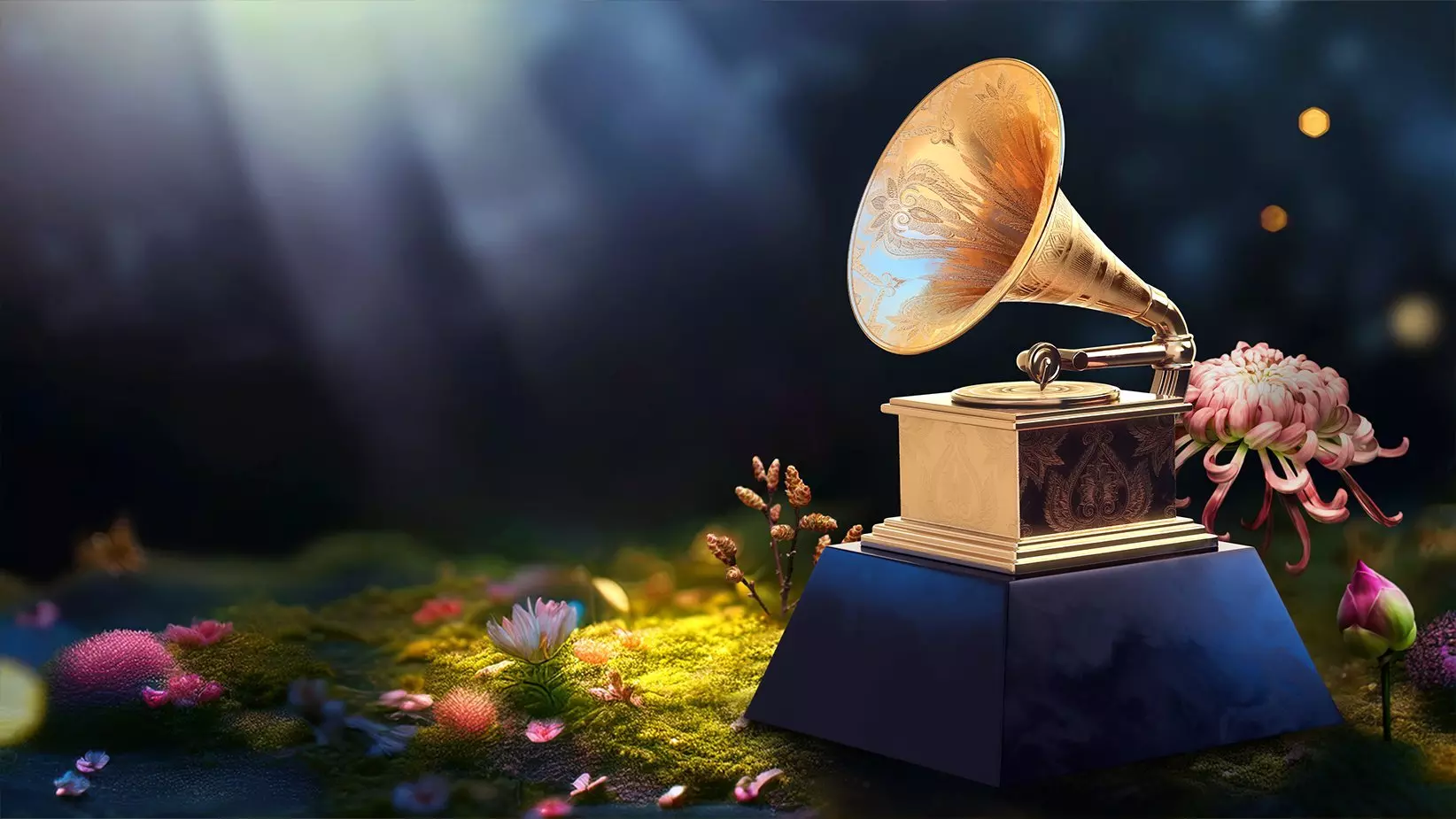
2025 GRAMMY Nominations: See Shaboozey, Anitta, Teddy Swims & More Artists' Reactions

Beyoncé & Taylor Swift Break More GRAMMY Records, Legacy Acts Celebrate Nods & Lots Of Firsts From The 2025 GRAMMY Nominations
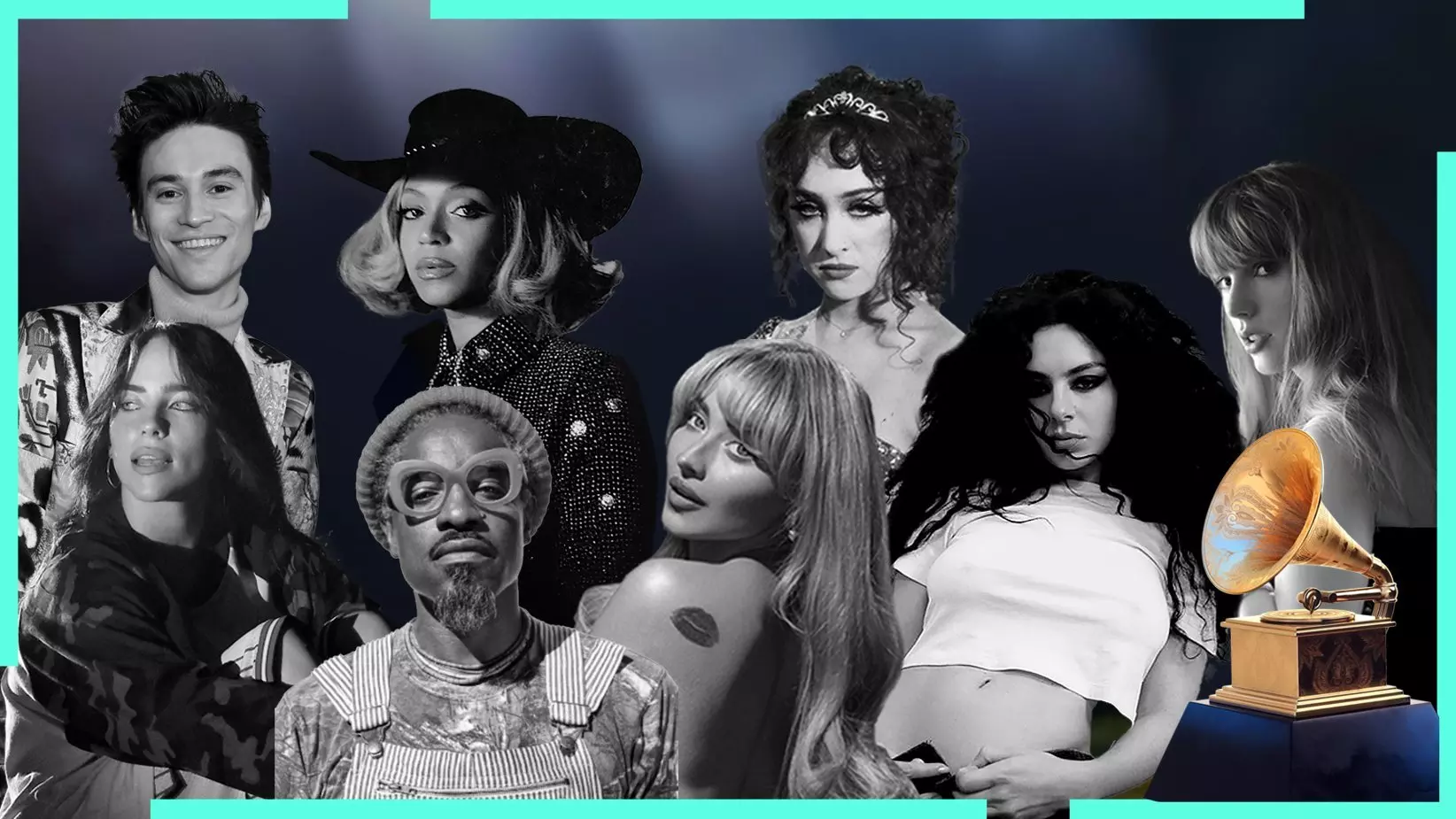
2025 GRAMMYs Nominations: Album Of The Year Nominees
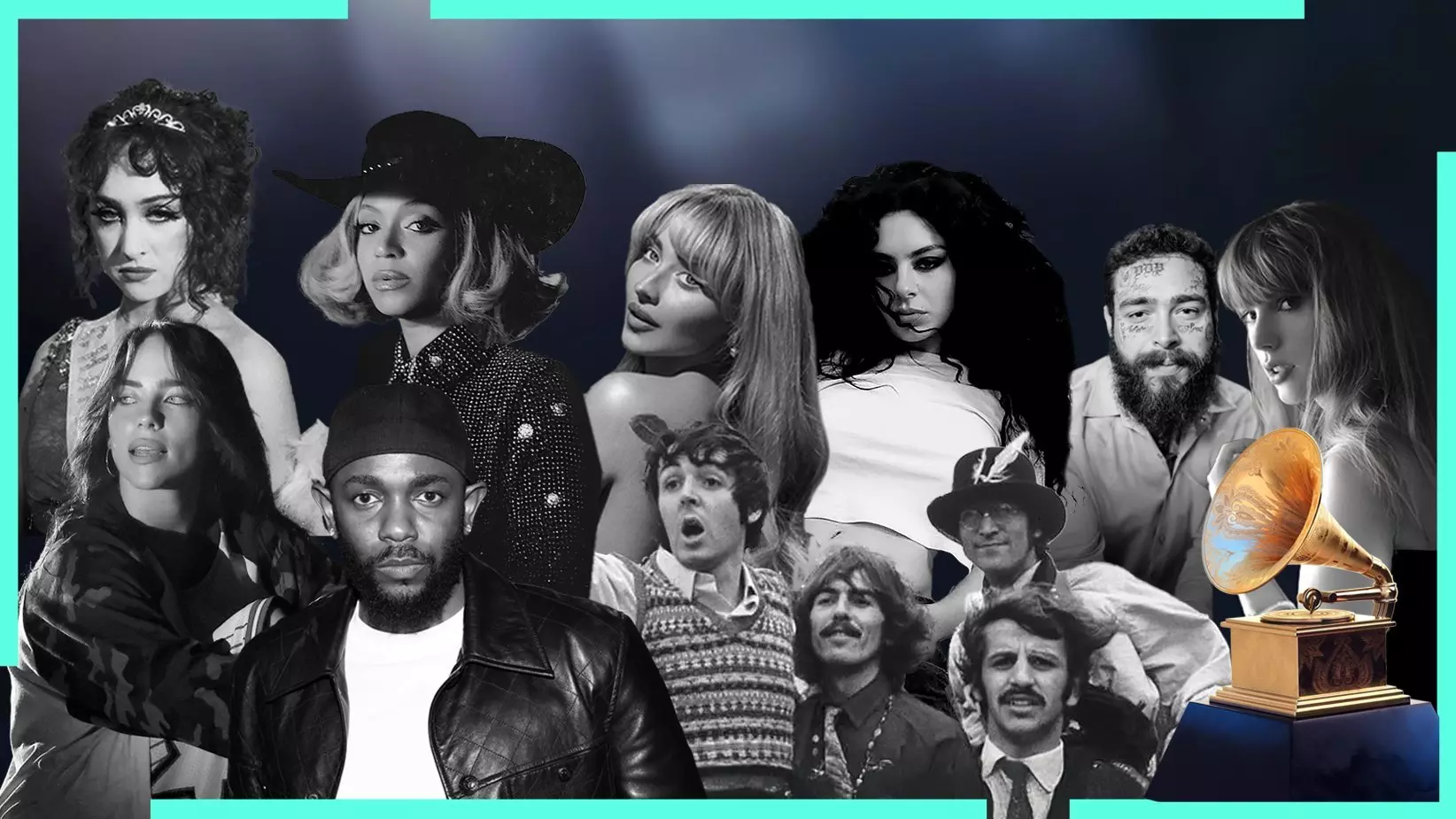
2025 GRAMMYs Nominations: Record Of The Year Nominees

Photo: Jeremy Cowart
interview
Behind Ryan Tedder's Hits: Stories From The Studio With OneRepublic, Beyoncé, Taylor Swift & More
As OneRepublic releases their latest album, the group's frontman and pop maverick gives an inside look into some of the biggest songs he's written — from how Beyoncé operates to Tom Cruise's prediction for their 'Top Gun' smash.
Three months after OneRepublic began promoting their sixth album, Artificial Paradise, in February 2022, the band unexpectedly had their biggest release in nearly a decade. The pop-rock band's carefree jam, "I Ain't Worried," soundtracked Top Gun: Maverick's most memeable scene and quickly became a global smash — ultimately delaying album plans in favor of promoting their latest hit.
Two years later, "I Ain't Worried" is one of 16 tracks on Artificial Paradise, which arrived July 12. It's a seamless blend of songs that will resonate with longtime and newer fans alike. From the layered production of "Hurt," to the feel-good vibes of "Serotonin," to the evocative lyrics of "Last Holiday," Artificial Paradise shows that OneRepublic's sound is as dialed-in as it is ever-evolving.
The album also marks the end of an era for OneRepublic, as it's the last in their contract with Interscope Records. But for the group's singer, Ryan Tedder, that means the future is even more exciting than it's been in their entire 15-year career.
"I've never been more motivated to write the best material of my life than this very moment," he asserts. "I'm taking it as a challenge. We've had a lot of fun, and a lot of uplifting records for the last seven or eight years, but I also want to tap back into some deeper material with the band."
As he's been prepping Artificial Paradise with his OneRepublic cohorts, Tedder has also been as busy as he's ever been working with other artists. His career as a songwriter/producer took off almost simultaneously with OneRepublic's 2007 breakthrough, "Apologize" (his first major behind-the-board hit was Leona Lewis' "Bleeding Love"); to this day he's one of the go-to guys for pop's biggest names, from BLACKPINK to Tate McRae.
Tedder sat down with GRAMMY.com to share some of his most prominent memories of OneRepublic's biggest songs, as well as some of the hits he's written with Beyoncé, Adele, Taylor Swift and more.
OneRepublic — "Apologize," 'Dreaming Out Loud' (2007)
I was producing and writing other songs for different artists on Epic and Atlantic — I was just cutting my teeth as a songwriter in L.A. This is like 2004. I was at my lowest mentally and financially. I was completely broke. Creditors chasing me, literally dodging the taxman and getting my car repoed, everything.
I had that song in my back pocket for four years. A buddy of mine just reminded me last month, a songwriter from Nashville — Ashley Gorley, actually. We had a session last month, me, him and Amy Allen, and he brought it up. He was like, "Is it true, the story about 'Apologize'? You were completely broke living in L.A. and Epic Records offered you like 100 grand or something just for the right to record the song on one of their artists?"
And that is true. It was, like, 20 [grand], then 50, then 100. And I was salivating. I was, like, I need this money so bad. And I give so many songs to other people, but with that song, I drew a line in the sand and said, "No one will sing this song but me. I will die with this song."
It was my story, and I just didn't want anyone else to sing it. It was really that simple. It was a song about my past relationships, it was deeply personal. And it was also the song that — I spent two years trying to figure out what my sound was gonna be. I was a solo artist… and I wasn't landing on anything compelling. Then I landed on "Apologize" and a couple of other songs, and I was like, These songs make me think of a band, not solo artist material. So it was the song that led me to the sound of OneRepublic, and it also led me to the idea that I should start a band and not be a solo artist.
We do it every night. I'll never not do it. I've never gotten sick of it once. Every night that we do it, whether I'm in Houston or Hong Kong, I look out at the crowd and look at the band, and I'm like, Wow. This is the song that got us here.
Beyoncé — "Halo," 'I Am…Sacha Fierce' (2008)
We were halfway through promoting Dreaming Out Loud, our first album. I played basketball every day on tour, and I snapped my Achilles. The tour got canceled. The doctor told me not to even write. And I had this one sliver of an afternoon where my wife had to run an errand. And because I'm sadistic and crazy, I texted [songwriter] Evan Bogart, "I got a three-hour window, race over here. Beyoncé called me and asked me to write her a song. I want to do it with you." He had just come off his huge Rihanna No. 1, and we had an Ashley Tisdale single together.
When you write enough songs, not every day do the clouds part and God looks down on you and goes, "Here." But that's what happened on that day. I turn on the keyboard, the first sound that I play is the opening sound of the song. Sounds like angels singing. And we wrote the song pretty quick, as I recall.
I didn't get a response [from Beyoncé after sending "Halo" over], which I've now learned is very, very typical of her. I did Miley Cyrus and Beyoncé "II MOST WANTED" [from COWBOY CARTER] — I didn't know that was coming out 'til five days before it came out. And when I did "XO" [from 2013's Beyoncé], I found out that "XO" was coming out 12 hours before it came out. That's how she operates.
OneRepublic — "Good Life," 'Waking Up' (2009)
["Good Life"] was kind of a Hail Mary. We already knew that "All the Right Moves" would be the first single [from Waking Up]. We knew that "Secrets" was the second single. And in the 11th hour, our engineer at the time — who I ended up signing as a songwriter, Noel Zancanella — had this drum loop that he had made, and he played it for Brent [Kutzle] in our band. Brent said, "You gotta hear this drum loop that Noel made. It's incredible."
He played it for me the next morning, and I was like, "Yo throw some chords to this. I'm writing to this today." They threw some chords down, and the first thing out of my mouth was, [sings] "Oh, this has gotta be the good life."
It's the perfect example of, oftentimes, the chord I've tried to strike with this band with some of our bigger records, [which] is happy sad. Where you feel nostalgic and kind of melancholic, but at the same time, euphoric. That's what those chords and that melody did for me.
I was like, "Hey guys, would it be weird if I made the hook a whistle?" And everyone was like, "No! Do not whistle!" They're like, "Name the last hit song that had a whistle." And the only one I could think of was, like, Scorpion from like, 1988. [Laughs.] So I thought, To hell with it, man, it's been long enough, who cares? Let's try it. And the whistle kind of made the record. It became such a signature thing.
Adele — "Rumour Has It," '21' (2011)
"Rumour Has It" was the first song I did in probably a four year period, with any artist, that wasn't a ballad. All any artist ever wanted me to write with them or for them, was ballads, because of "Halo," and "Apologize" and "Bleeding Love."
I begged [Adele] to do a [song with] tempo, because we did "Turning Tables," another ballad. She was in a feisty mood [that day], so I was like, "Okay, we're doing a tempo today!"
Rick Rubin was originally producing the whole album. I was determined to produce Adele, not just write — because I wanted a shot to show her that I could, and to show myself. I stayed later after she left, and I remember thinking, What can I do in this record in this song that could be so difficult to reproduce that it might land me the gig?
So I intentionally muted the click track, changed the tempo, and [created that] whole piano bridge. I was making it up as I went. When she got in that morning. I said, "I have a crazy idea for a bridge. It's a movie." She listens and she says, "This is really different, I like this! How do we write to this?"
I mean, it was very difficult. [But] we finished the song. She recorded the entire song that day. She recorded the whole song in one take. I've never seen anyone do that in my life — before or since.
Then I didn't hear from her for six months. Because I handed over the files, and Rick Rubin's doing it, so I don't need to check on it. I randomly check on the status of the song — and at this point, if you're a songwriter or producer, you're assuming that they're not keeping the songs. Her manager emails my manager, "Hey, good news — she's keeping both songs they did, and she wants Ryan to finish 'Rumour Has It' production and mix it."
When I finally asked her, months later — probably at the GRAMMYs — I said, "Why didn't [Rick] do it?" She said, "Oh he did. It's that damn bridge! Nobody could figure out what the hell you were doing…It was so problematic that we just gave up on it."
OneRepublic — "Counting Stars," 'Native' (2013)
I was in a Beyoncé camp in the Hamptons writing for the self-titled album. [There were] a bunch of people in the house — me, Greg Kurstin, Sia — it was a fun group of people. I had four days there, and every morning I'd get up an hour and a half before I had to leave, make a coffee, and start prepping for the day. On the third day, I got up, I'm in the basement of this house at like 7 in the morning, and I'm coming up with ideas. I stumble across that chord progression, the guitar and the melody. It was instant shivers up my spine.
"Lately I've been losing sleep, dreaming about the things that we could be" is the only line that I had. [My] first thought was, I should play this for Beyoncé, and then I'm listening to it and going, This is not Beyoncé, not even remotely. It'd be a waste. So I tabled it, and I texted the guys in my band, "Hey, I think I have a potentially really big record. I'm going to finish it when I get back to Denver."
I got back the next week, started recording it, did four or five versions of the chorus, bouncing all the versions off my wife, and then eventually landed it. And when I played it for the band, they were like, "This is our favorite song."
Taylor Swift — "Welcome to New York," '1989' (2014)
It was my second session with Taylor. The first one was [1989's] "I Know Places," and she sent me a voice memo. I was looking for a house in Venice [California], because we were spending so much time in L.A. So that whole memory is attached to me migrating back to Los Angeles.
But I knew what she was talking about, because I lived in New York, and I remember the feeling — endless possibilities, all the different people and races and sexes and loves. That was her New York chapter. She was so excited to be there. If you never lived there, and especially if you get there and you've got a little money in the pocket, it is so exhilarating.
It was me just kind of witnessing her brilliant, fast-paced, lyrical wizardry. [Co-producer] Max [Martin] and I had a conversation nine months later at the GRAMMYs, when we had literally just won for 1989. He kind of laughed, he pointed to all the other producers on the album, and he's like, "If she had, like, three more hours in the day, she would just figure out what we do and she would do it. And she wouldn't need any of us."
And I still think that's true. Some people are just forces of nature in and among themselves, and she's one of them. She just blew me away. She's the most talented top liner I've ever been in a room with, bar none. If you're talking lyric and melody, I've never been in a room with anyone faster, more adept, knows more what they want to say, focused, efficient, and just talented.
Jonas Brothers — "Sucker," 'Happiness Begins' (2019)
I had gone through a pretty dry spell mentally, emotionally. I had just burned it at both ends and tapped out, call it end of 2016. So, really, all of 2017 for me was a blur and a wash. I did a bunch of sessions in the first three months of the year, and then I just couldn't get a song out. I kept having, song after song, artists telling me it's the first single, [then] the song was not even on the album. I had never experienced that in my career.
I went six to nine months without finishing a song, which for me is unheard of. Andrew Watt kind of roped me back into working with him. We did "Easier" for 5 Seconds of Summer, and we did some Sam Smith and some Miley Cyrus, and right in that same window, I did this song "Sucker." Two [or] three months later, Wendy Goldstein from Republic [Records] heard the record, I had sent it to her. She'd said, very quietly, "We're relaunching the Jonas Brothers. They want you to be involved in a major way. Do you have anything?"
She calls me, she goes, "Ryan, do not play this for anybody else. This is their comeback single. It's a No. 1 record. Watch what we're gonna do." And she delivered.
OneRepublic — "I Ain't Worried," 'Top Gun: Maverick' Soundtrack (2022)
My memory is, being in lockdown in COVID, and just being like, Who knows when this is going to end, working out of my Airstream at my house. I had done a lot of songs for movies over the years, and [for] that particular [song] Randy Spendlove, who runs [music at] Paramount, called me.
I end up Zooming with Tom Cruise [and Top Gun: Maverick director] Jerry Bruckheimer — everybody's in lockdown during post-production. The overarching memory was, Holy cow, I'm doing the scene, I'm doing the song for Top Gun. I can't believe this is happening. But the only way I knew how to approach it, rather than to, like, overreact and s— the bed, was, It's just another day.
I do prescription songs for movies, TV, film all the time. I love a brief. It's so antithetical to most writers. I'm either uncontrollably lazy or the most productive person you've ever met. And the dividing line between the two is, if I'm chasing some directive, some motivation, some endpoint, then I can be wildly productive.
I just thought, I'm going to do the absolute best thing I can do for this scene and serve the film. OneRepublic being the performing artist was not on the menu in my mind. I just told them, "I think you need a cool indie band sounding, like, breakbeat." I used adjectives to describe what I heard when I saw the scene, and Tom got really ramped and excited.
You could argue [it's the biggest song] since the band started. The thing about it is, it's kind of become one of those every summer [hits]. And when it blew up, that's what Tom said. He said, "Mark my words, dude. You're gonna have a hit with this every summer for, like, the next 20 years or more."
And that's what happened. The moment Memorial Day happened, "I Ain't Worried" got defrosted and marched itself back into the top 100.
Tate McRae — "Greedy," 'THINK LATER' (2023)
We had "10:35" [with Tiësto] the previous year that had been, like, a No. 1 in the UK and across Europe and Australia. So we were coming off the back of that, and the one thing she was clear about was, "That is not the direction of what I want to do."
If my memory serves me correct, "greedy" was the next to last session we had. Everything we had done up to that point was kind of dark, midtempo, emotional. So "greedy" was the weirdo outlier. I kept pushing her to do a dance record. I was like, "Tate, there's a lot of people that have great voices, and there's a lot of people who can write, but none of those people are professional dancers like you are. Your secret weapon is the thing you're not using. In this game and this career, you've got to use every asset that you have and exploit it."
There was a lot of cajoling. On that day, we did it, and I thought it was badass, and loved it. And she was like, "Ugh, what do we just do? What is this?"
So then it was just, like, months, months and months of me constantly bringing that song back up, and playing it for her, and annoying the s— out of her. And she came around on it.
She has very specific taste. So much of the music with Tate, it really is her steering. I'll do what I think is like a finished version of a song, and then she will push everyone for weeks, if not months, to extract every ounce of everything out of them, to push the song harder, further, edgier — 19 versions of a song, until finally she goes, "Okay, this is the one." She's a perfectionist.
OneRepublic — "Last Holiday," 'Artificial Paradise' (2024)
I love [our latest single] "Hurt," but my favorite song on the album is called "Last Holiday." I probably started the beginning of that lyric, I'm not joking, seven, eight years ago. But I didn't finish it 'til this past year.
The verses are little maxims and words of advice that I've been given throughout the years. It's almost cynical in a way, the song. When I wrote the chorus, I was definitely in kind of a down place. So the opening line is, "So I don't believe in the stars anymore/ They never gave me what I wished for." And it's, obviously, a very not-so-slight reference to "Counting Stars." But it's also hopeful — "We've got some problems, okay, but this isn't our last holiday."
It's very simple sentiments. Press pause. Take some moments. Find God before it all ends. All these things with this big, soaring chorus. Musically and emotionally and sonically, that song — and "Hurt," for sure — but "Last Holiday" is extremely us-sounding.
The biggest enemy that we've had over the course of 18 years, I'll be the first to volunteer, is, this ever-evolving, undulating sound. No one's gonna accuse me of making these super complex concept albums, because that's just not how my brain's wired. I grew up listening to the radio. I didn't grow up hanging out in the Bowery in CBGBs listening to Nick Cave. So for us, the downside to that, and for me doing all these songs for all these other people, is the constant push and pull of "What is their sound? What genre is it?"
I couldn't put a pin in exactly what the sound is, but what I would say is, if you look at the last 18 years, a song like "Last Holiday" really encompasses, sonically, what this band is about. It's very moving, and emotional, and dynamic. It takes me to a place — that's the best way for me to put it. And hopefully the listener finds the same.
Latest News & Exclusive Videos
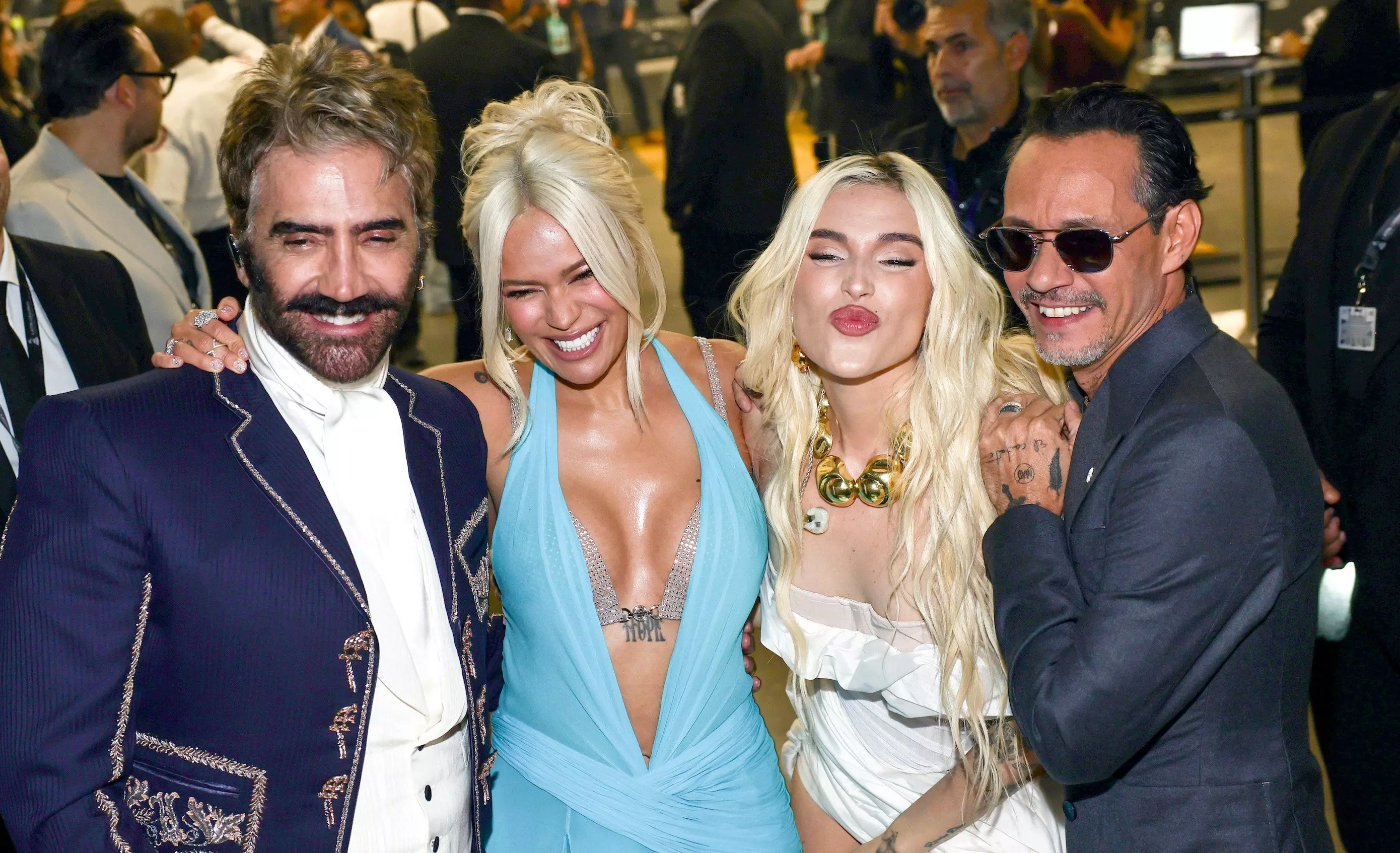
10 Meaningful Moments From The 2024 Latin GRAMMYs: Karol G's Heartfelt Speech, Tributes To Late Legends & More
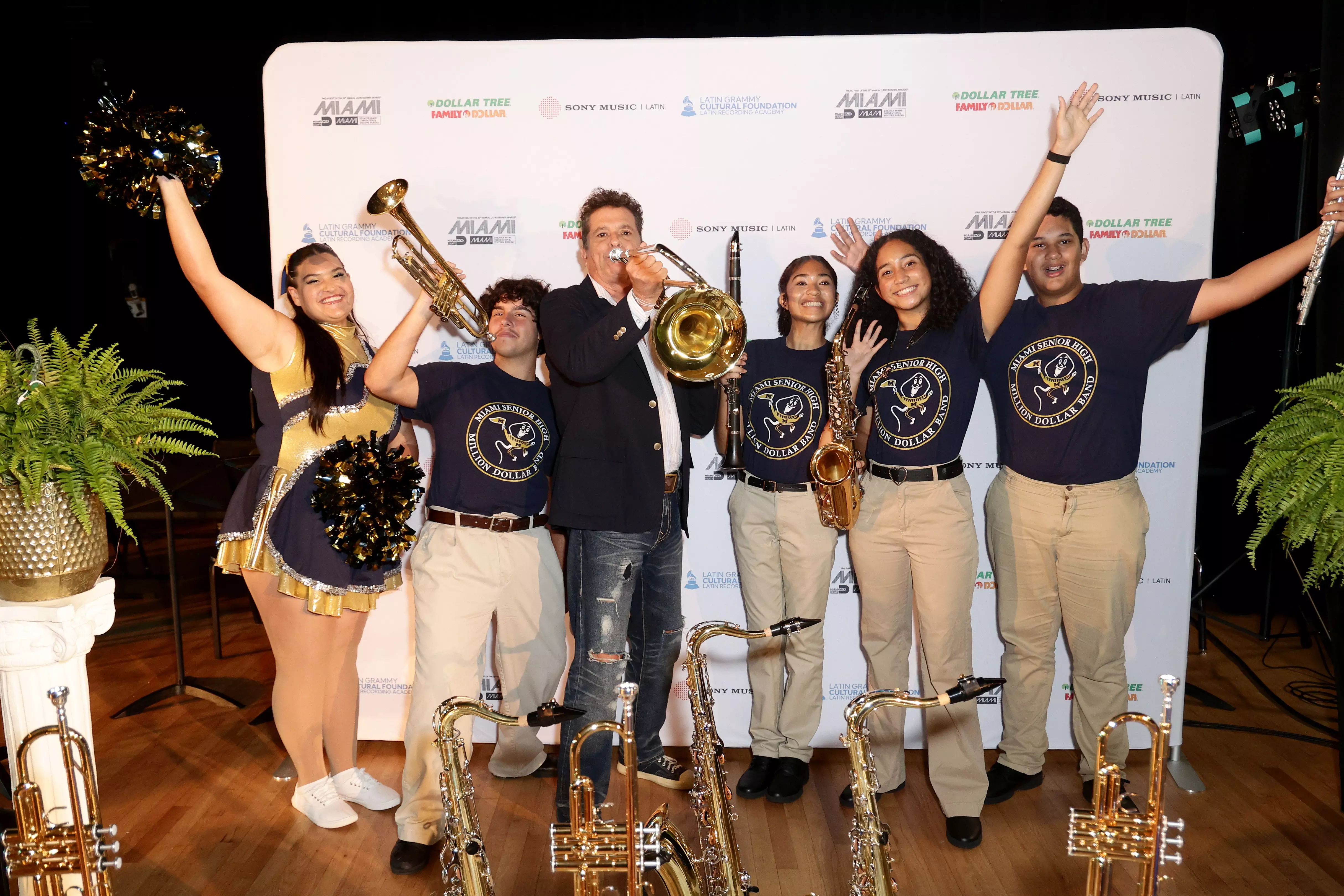
Behind The Scenes At Latin GRAMMY Week 2024: Inside VIP Celebrations & More
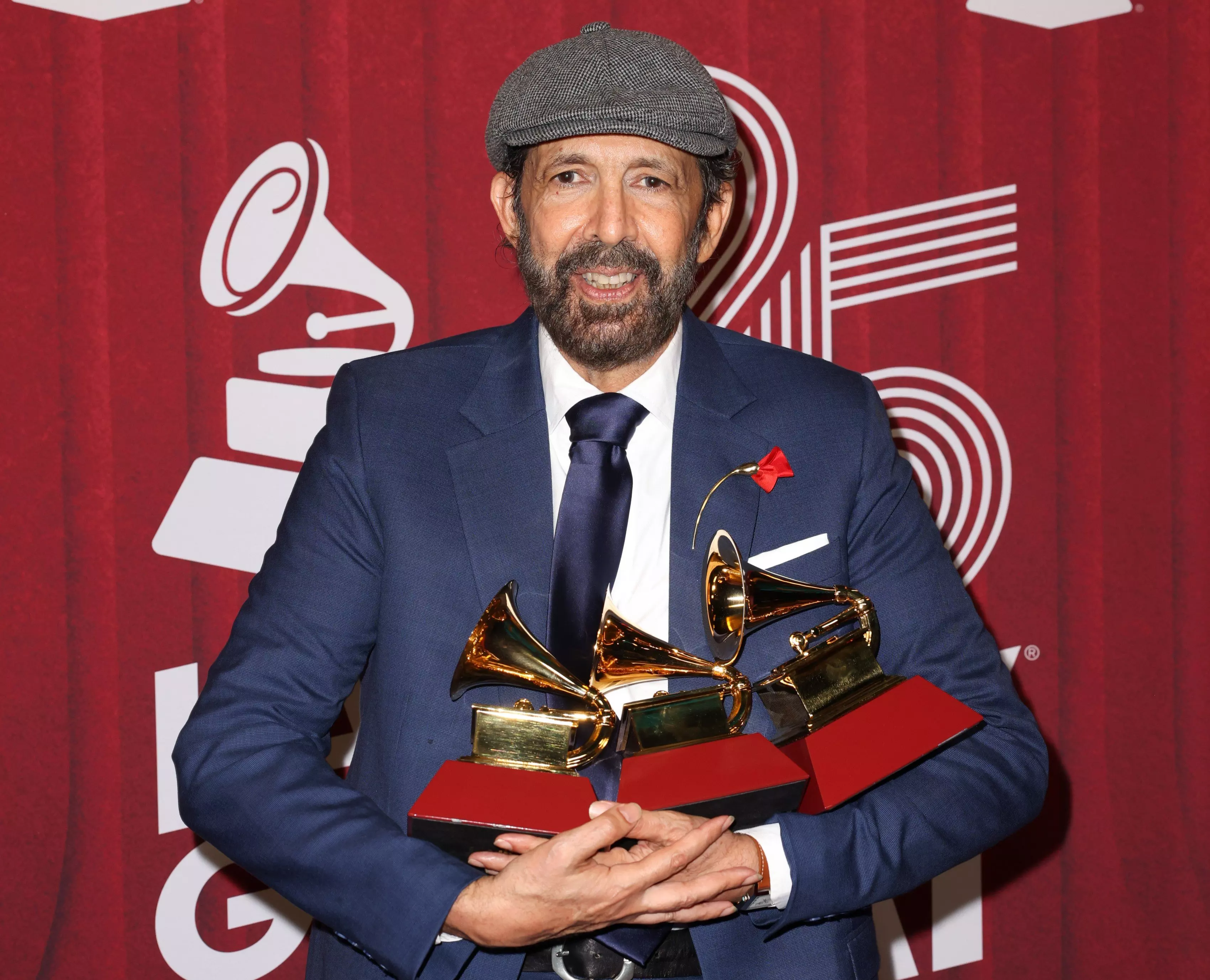
Juan Luis Guerra Sweeps The 2024 Latin GRAMMYs With 'Radio Güira'
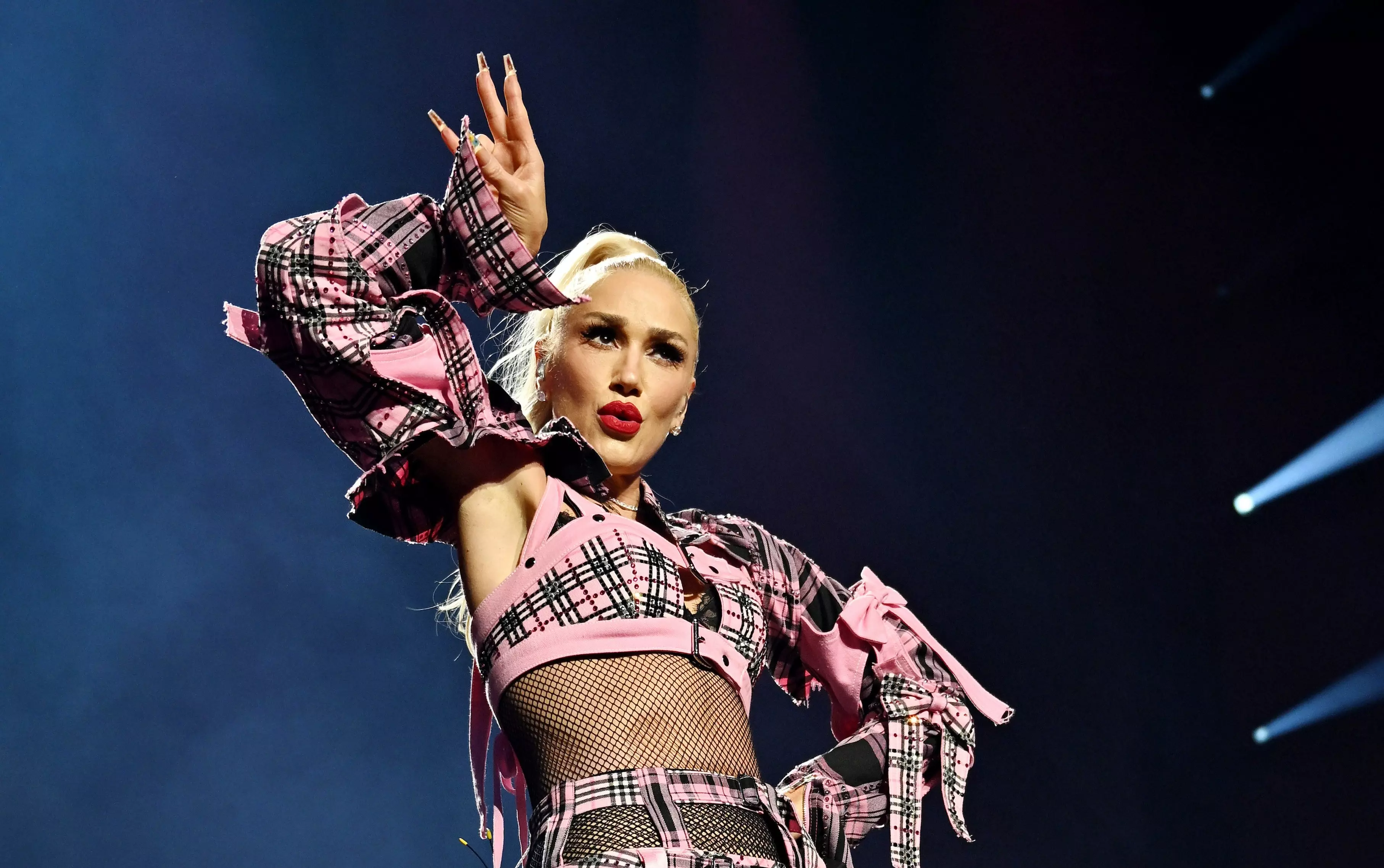
How Gwen Stefani's New Album 'Bouquet' Celebrates A Career Built On Love In All Its Forms
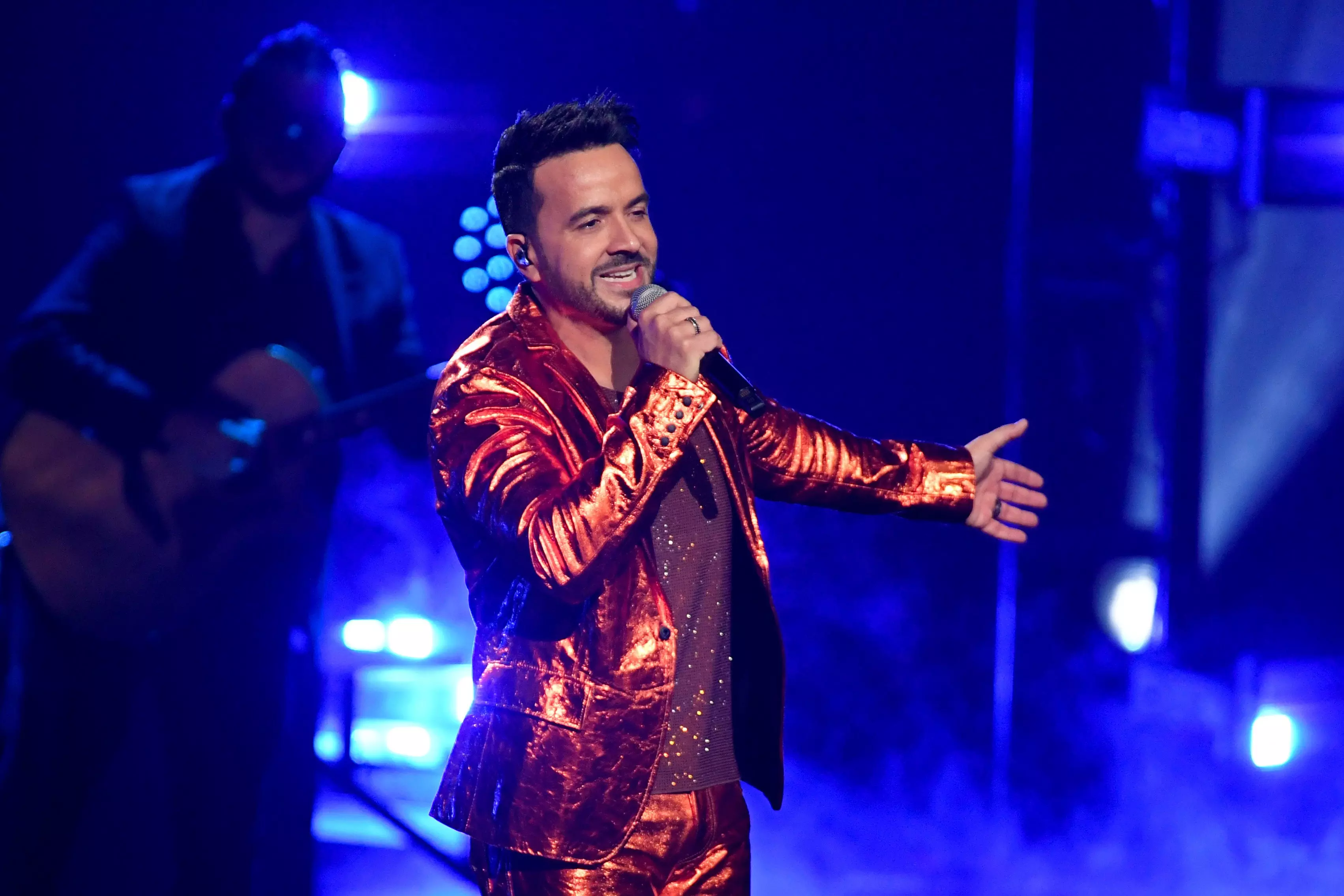
Watch: Luis Fonsi Performs "Despacito" & Two More Of His Classics At The 2024 Latin GRAMMYs

Photo: Aitor Laspiur
interview
Omar Apollo Embraces Heartbreak And Enters His "Zaddy" Era On 'God Said No'
Alongside producer Teo Halm, Omar Apollo discusses creating 'God Said No' in London, the role of poetry in the writing process, and eventually finding comfort in the record's "proof of pain."
"Honestly, I feel like a zaddy," Omar Apollo says with a roguish grin, "because I'm 6'5" so, like, you can run up in my arms and stay there, you know what I mean?"
As a bonafide R&B sensation and one of the internet’s favorite boyfriends, Apollo is likely used to the labels, attention and online swooning that come with modern fame. But in this instance, there’s a valid reason for asking about his particular brand of "zaddyhood": he’s been turned into a Bratz doll.
In the middle of June, the popular toy company blasted a video to its nearly 5 million social media followers showing off the singer as a real-life Bratz Boy — the plastic version draped in a long fur coat (shirtless, naturally), with a blinged-out cross necklace and matching silver earrings as he belts out his 2023 single "3 Boys" from a smoke-covered stage.
The video, which was captioned "Zaddy coded," promptly went viral, helped along by an amused Apollo reposting the clip to his own Instagram Story. "It was so funny," he adds. "And it's so accurate; that's literally how my shows go. It made me look so glamorous, I loved it."
The unexpected viral moment came with rather auspicious timing, considering Apollo is prepping for the release of his hotly anticipated sophomore album. God Said No arrives June 28 via Warner Records.
In fact, the star is so busy with the roll-out that, on the afternoon of our interview, he’s FaceTiming from the back of a car. The day prior, he’d filmed the music video for "Done With You," the album’s next single. Now he’s headed to the airport to jet off to Paris, where he’ll be photographed front row at the LOEWE SS25 men’s runway show in between Sabrina Carpenter and Mustafa — the latter of whom is one of the few collaborators featured on God Said No.
Apollo’s trusted co-writer and producer, Teo Halm, is also joining the conversation from his home studio in L.A. In between amassing credits for Beyoncé (The Lion King: The Gift), Rosalía and J Balvin (the Latin GRAMMY-winning "Con Altura"), SZA ("Notice Me" and "Open Arms" featuring Travis Scott) and others, the 25-year-old virtuoso behind the boards had teamed up with Apollo on multiple occasions. Notably, the two collabed on "Evergreen (You Didn’t Deserve Me At All)," which helped Apollo score his nomination for Best New Artist at the 2023 GRAMMYs.
In the wake of that triumph, Apollo doubled down on their creative chemistry by asking Halm to executive produce God Said No. (The producer is also quick to second his pal’s magnetic mystique: "Don't get it twisted, he's zaddy, for sure.")
Apollo bares his soul like never before across the album’s 14 tracks, as he processes the bitter end of a two-year relationship with an unnamed paramour. The resulting portrait of heartbreak is a new level of emotional exposure for a singer already known for his unguarded vulnerability and naked candor. (He commissioned artist Doron Langberg to paint a revealing portrait of him for the cover of his 2023 EP Live For Me, and unapologetically included a painting of his erect penis as the back cover of the vinyl release.)
On lead single "Spite," he’s pulled between longing and resentment in the wake of the break-up over a bouncing guitar riff. Second single "Dispose of Me" finds Apollo heartsick and feeling abandoned as he laments, "It don’t matter if it’s 25 years, 25 months/ It don’t matter if it’s 25 days, it was real love/ We got too much history/ So don’t just dispose of me."
Elsewhere, the singer offers the stunning admission that "I would’ve married you" on album cut "Life’s Unfair." Then, on the very next song — the bumping, braggadocious "Against Me" — Apollo grapples with the reality that he’s been permanently altered by the love affair while on the prowl for a rebound. "I cannot act like I’m average/ You know that I am the baddest bitch," he proclaims on the opening verse, only to later admit, "I’ve changed so much, but have you heard?/ I can’t move how I used to."
More Omar Apollo News & Videos

Omar Apollo Embraces Heartbreak And Enters His "Zaddy" Era On 'God Said No'

How Danna Paola Created 'CHILDSTAR' By Deconstructing Herself

On Omar Apollo's New EP 'Live for Me,’ Limitless Experimentation Created Catharsis

Listen To GRAMMY.com's LGBTQIA+ Pride Month 2023 Playlist Featuring Demi Lovato, Sam Smith, Kim Petras, Frank Ocean, Omar Apollo & More
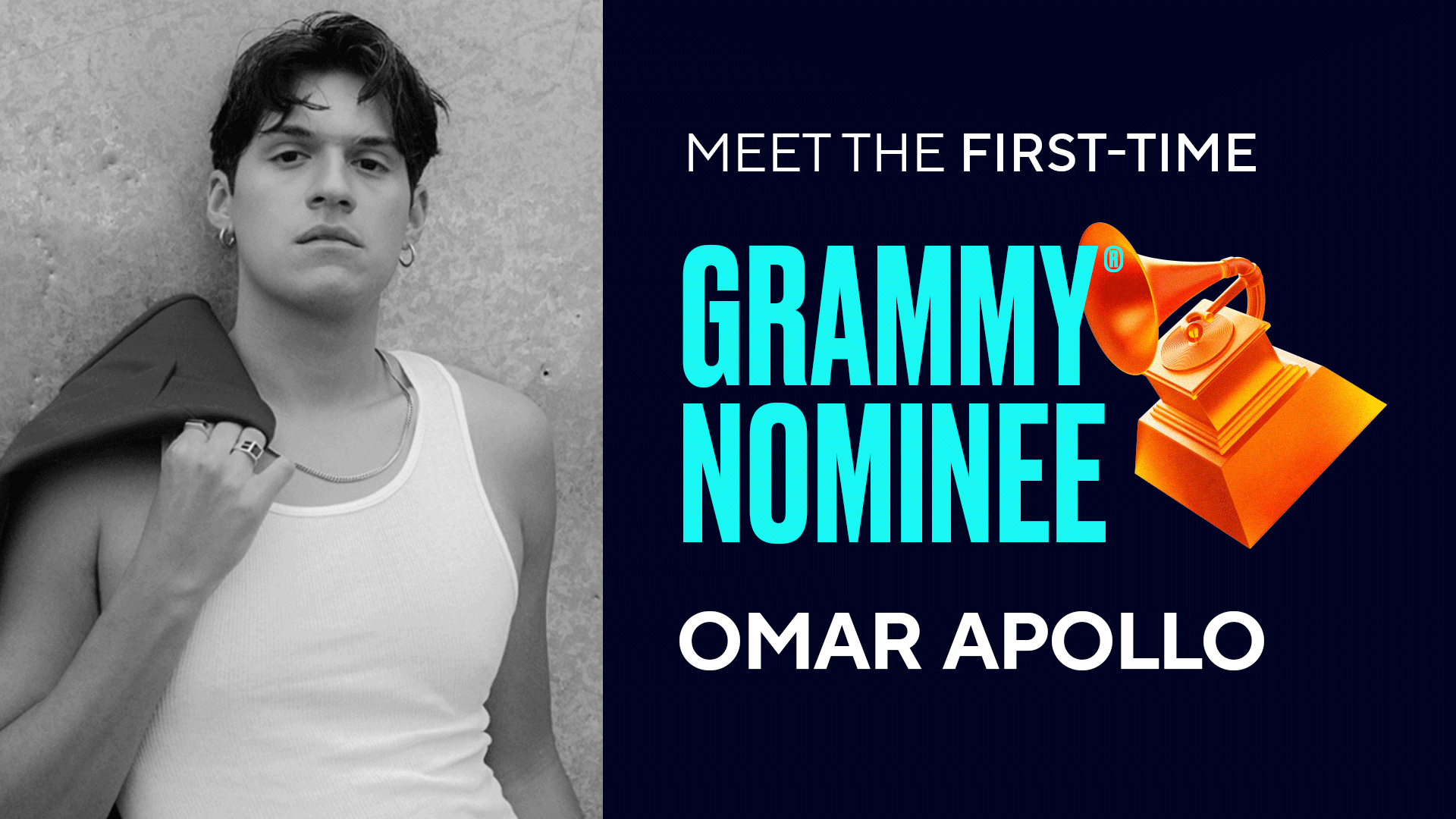
Omar Apollo On “Evergreen,” Growth & Longing
Given the personal subject matter filling God Said No — not to mention the amount of acclaim he earned with Ivory — it would be understandable if Apollo felt a degree of pressure or anxiety when it came to crafting his sophomore studio set. But according to the singer, that was entirely not the case.
"I feel like I wouldn’t be able to make art if I felt pressure," he says. "Why would I be nervous about going back and making more music? If anything, I'm more excited and my mind is opened up in a whole other way and I've learned so much."
In order to throw his entire focus into the album’s creation, Apollo invited Halm to join him in London. The duo set up shop in the famous Abbey Road Studios, where the singer often spent 12- to 13-hour days attempting to exorcize his heartbreak fueled by a steady stream of Aperol spritzes and cigarettes.
The change of scenery infused the music with new sonic possibilities, like the kinetic synths and pulsating bass line that set flight to "Less of You." Apollo and Halm agree that the single was directly inspired by London’s unique energy.
"It's so funny because we were out there in London, but we weren't poppin' out at all," the Halm says. "Our London scene was really just, like, studio, food. Omar was a frickin' beast. He was hitting the gym every day…. But it was more like feeding off the culture on a day-to-day basis. Like, literally just on the walk to the studio or something as simple as getting a little coffee. I don't think that song would've happened in L.A."
Poetry played a surprisingly vital role in the album’s creation as well, with Apollo littering the studio with collections by "all of the greats," including the likes of Ocean Vuong, Victoria Chang, Philip Larkin, Alan Ginsberg, Mary Oliver and more.
"Could you imagine making films, but never watching a film?" the singer posits, turning his appreciation for the written art form into a metaphor about cinema. "Imagine if I never saw [films by] the greats, the beauty of words and language, and how it's manipulated and how it flows. So I was so inspired."
Perhaps a natural result of consuming so much poetic prose, Apollo was also led to experiment with his own writing style. While on a day trip with his parents to the Palace of Versailles, he wrote a poem that ultimately became the soaring album highlight "Plane Trees," which sends the singer’s voice to new, shiver-inducing heights.
"I'd been telling Teo that I wanted to challenge myself vocally and do a power ballad," he says. "But it wasn't coming and we had attempted those songs before. And I was exhausted with writing about love; I was so sick of it. I was like, Argh, I don't want to write anymore songs with this person in my mind."
Instead, the GRAMMY nominee sat on the palace grounds with his parents, listening to his mom tell stories about her childhood spent in Mexico. He challenged himself to write about the majestic plane tree they were sitting under in order to capture the special moment.
Back at the studio, Apollo’s dad asked Halm to simply "make a beat" and, soon enough, the singer was setting his poem to music. (Later, Mustafa’s hushed coda perfected the song’s denouement as the final piece of the puzzle.) And if Apollo’s dad is at least partially responsible for how "Plane Trees" turned out, his mom can take some credit for a different song on the album — that’s her voice, recorded beneath the same plane tree, on the outro of delicate closer "Glow."
Both the artist and the producer ward off any lingering expectations that a happy ending will arrive by the time "Glow" fades to black, however. "The music that we make walks a tightrope of balancing beauty and tragedy," Halm says. "It's always got this optimism in it, but it's never just, like, one-stop shop happy. It's always got this inevitable pain that just life has.
"You know, even if maybe there wasn't peace in the end for Omar, or if that wasn't his full journey with getting through that pain, I think a lot of people are dealing with broken hearts who it really is going to help," the producer continues. "I can only just hope that the music imparts leaving people with hope."
Apollo agrees that God Said No contains a "hopeful thread," even if his perspective on the project remains achingly visceral. Did making the album help heal his broken heart? "No," he says with a sad smile on his face. "But it is proof of pain. And it’s a beautiful thing that is immortalized now, forever.
"One day, I can look back at it and be like, Wow, what a beautiful thing I experienced. But yeah, no, it didn't help me," he says with a laugh.
Latest News & Exclusive Videos

10 Meaningful Moments From The 2024 Latin GRAMMYs: Karol G's Heartfelt Speech, Tributes To Late Legends & More

Behind The Scenes At Latin GRAMMY Week 2024: Inside VIP Celebrations & More

Juan Luis Guerra Sweeps The 2024 Latin GRAMMYs With 'Radio Güira'

How Gwen Stefani's New Album 'Bouquet' Celebrates A Career Built On Love In All Its Forms

Watch: Luis Fonsi Performs "Despacito" & Two More Of His Classics At The 2024 Latin GRAMMYs

